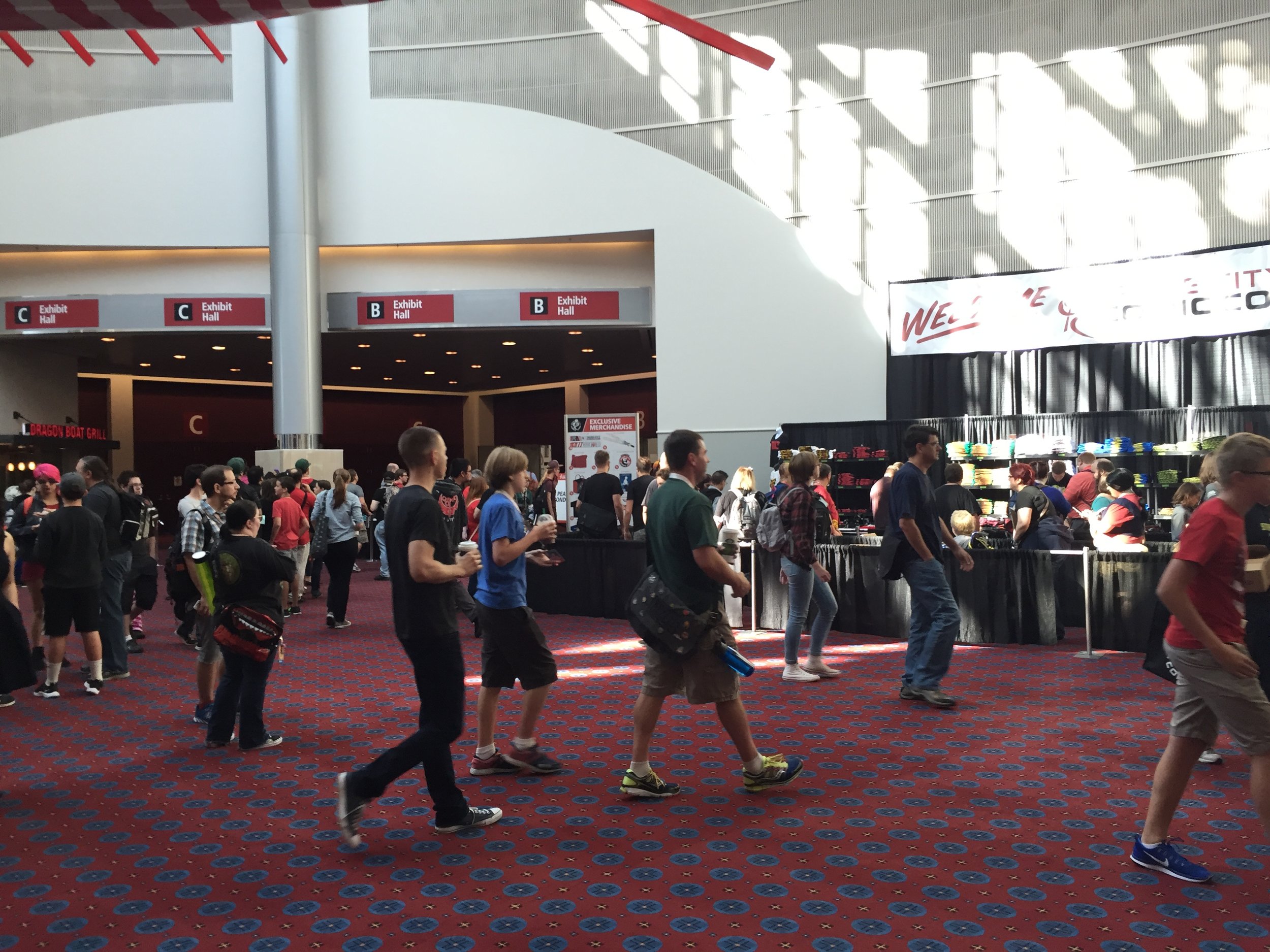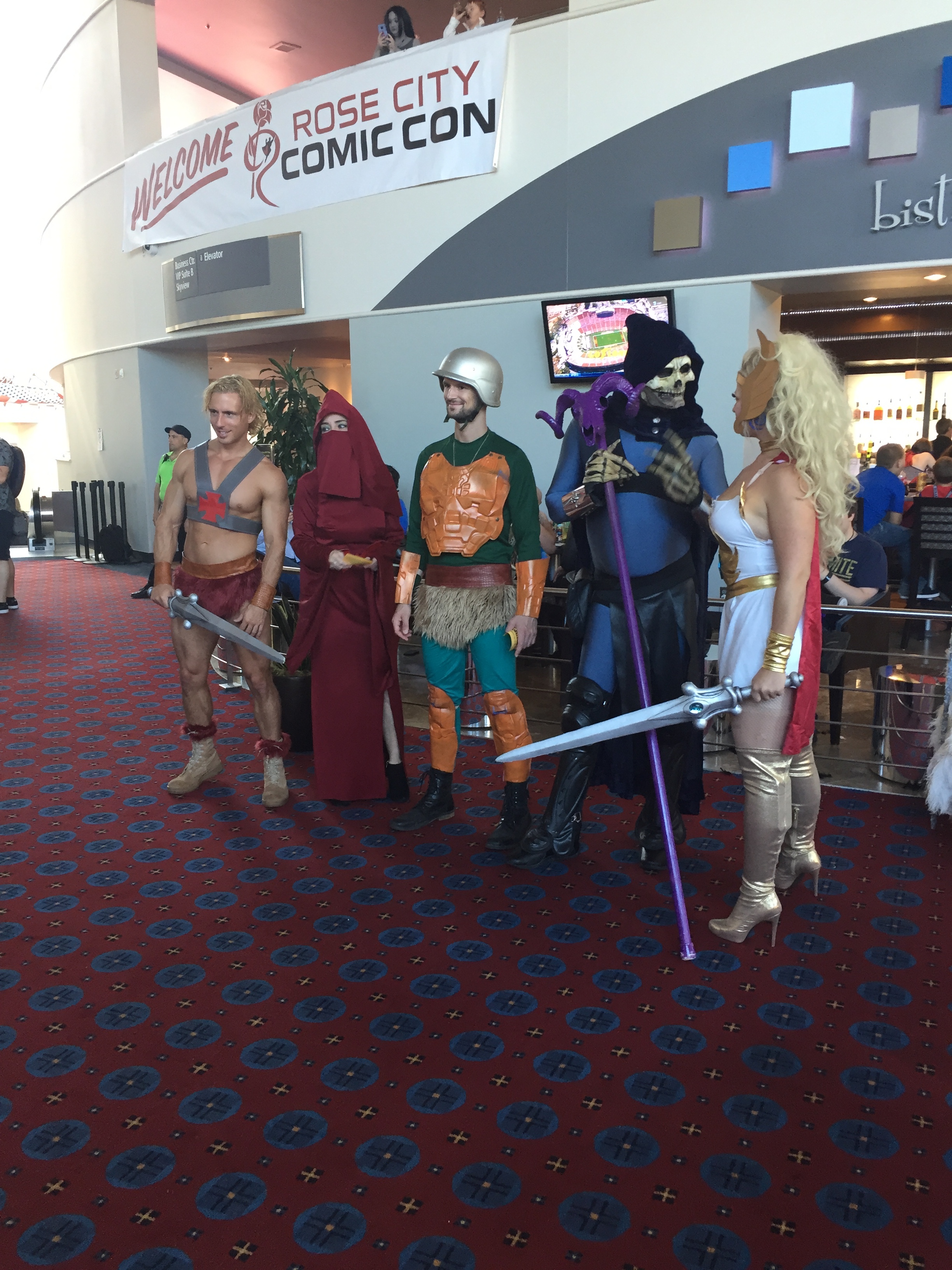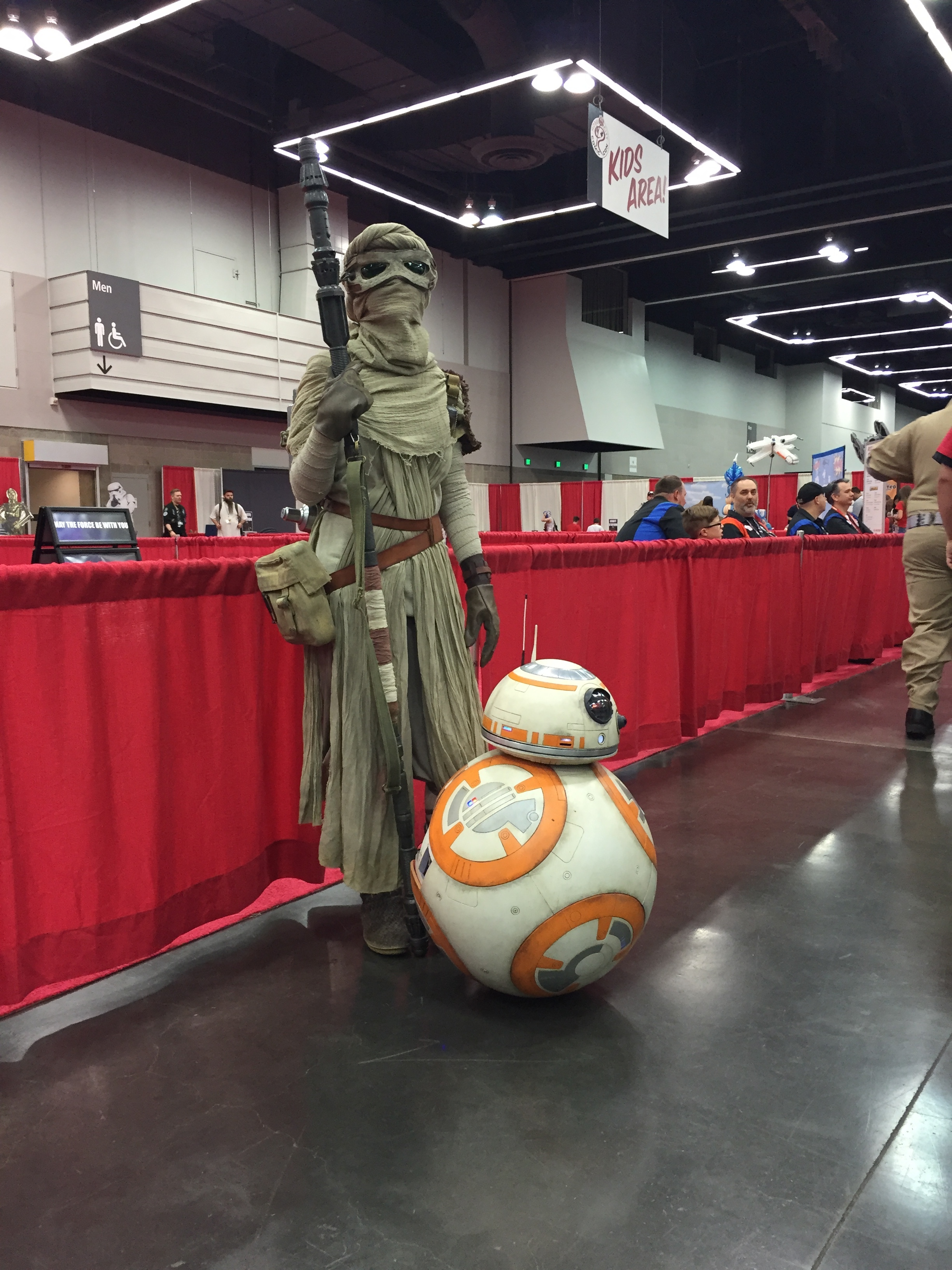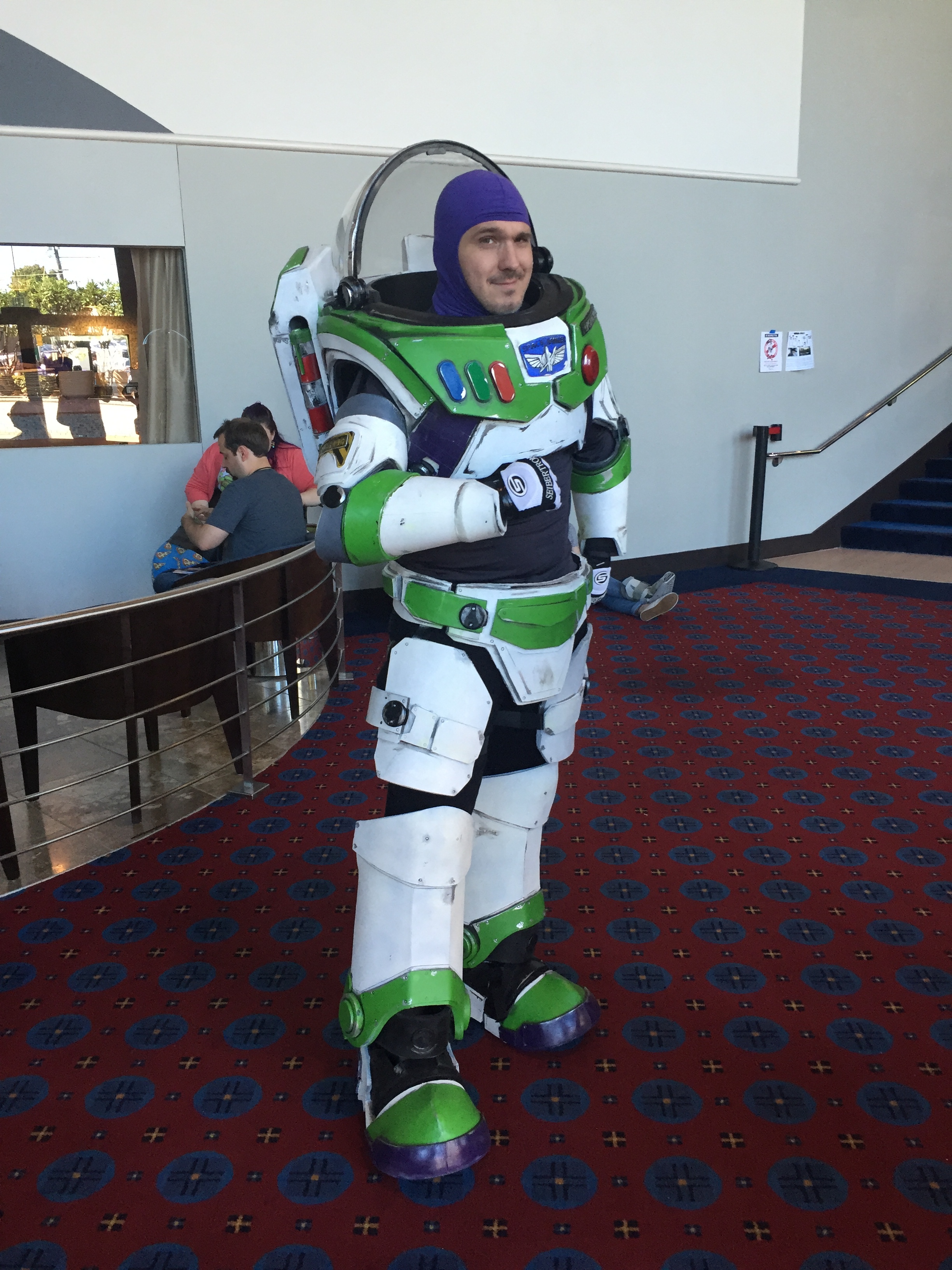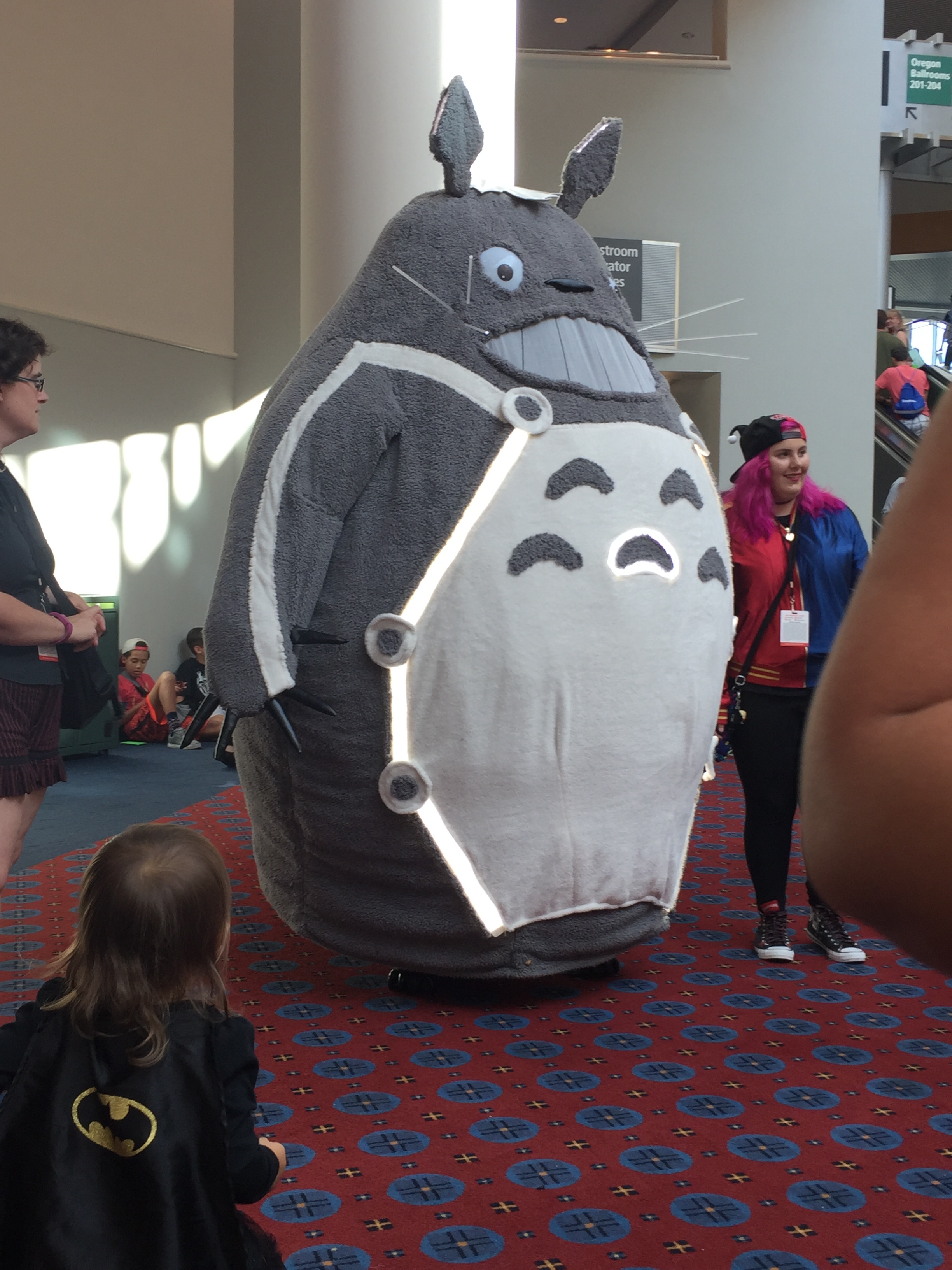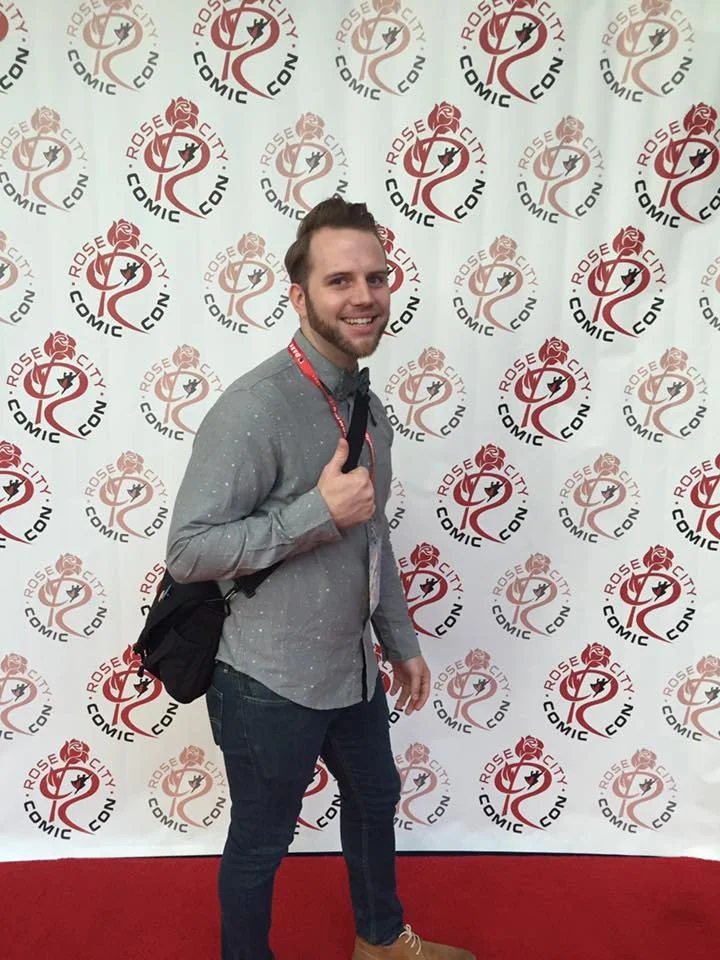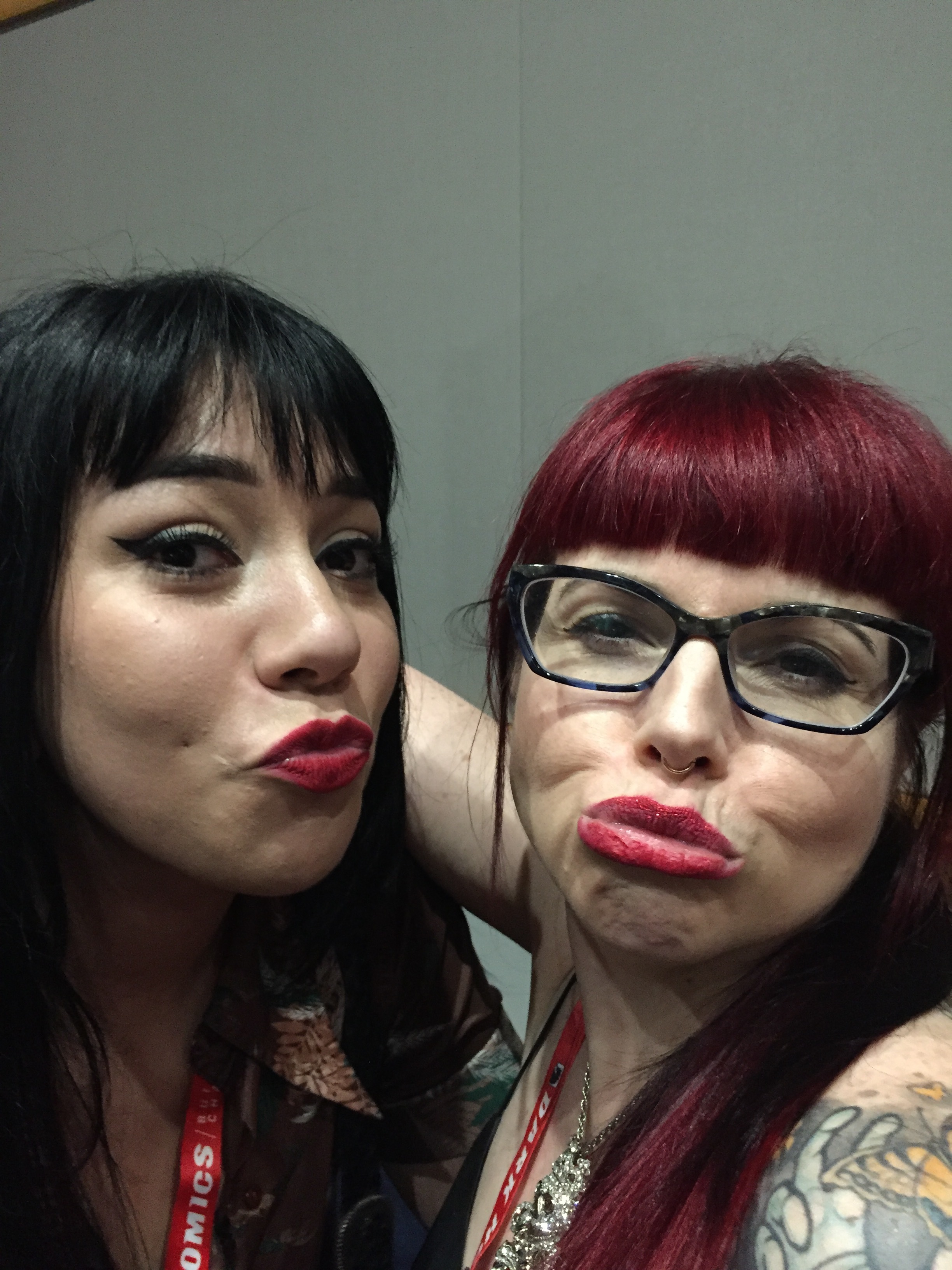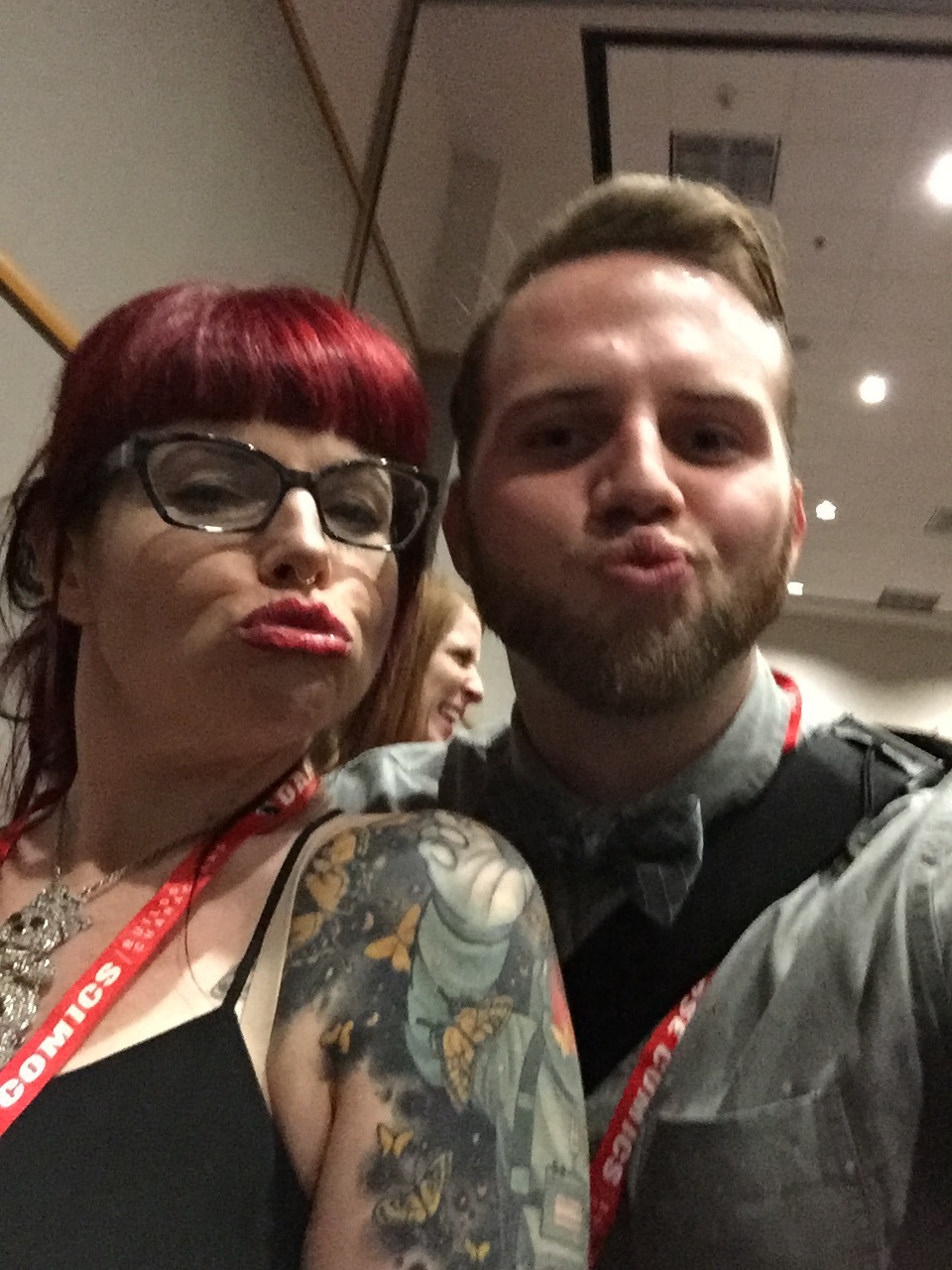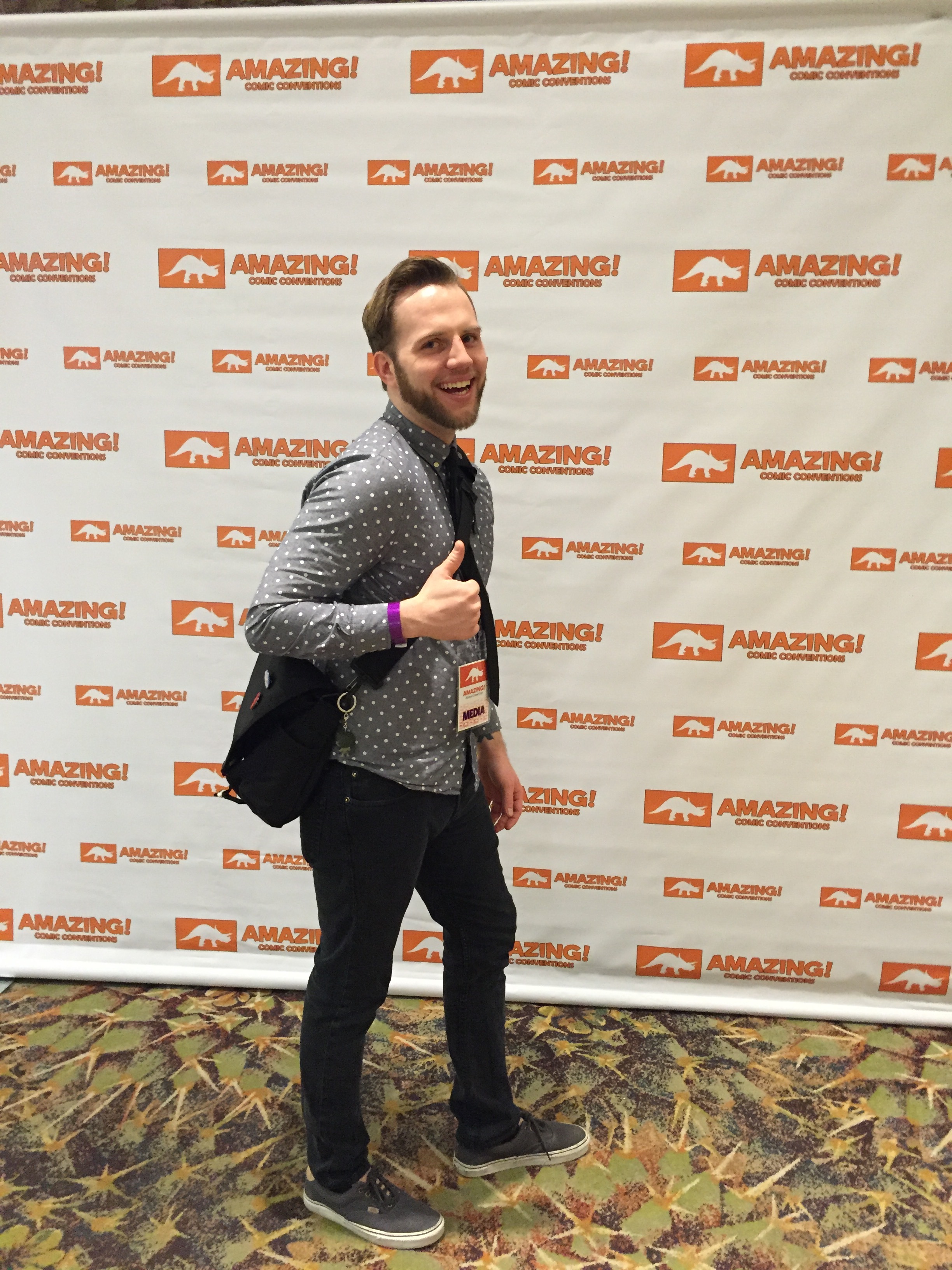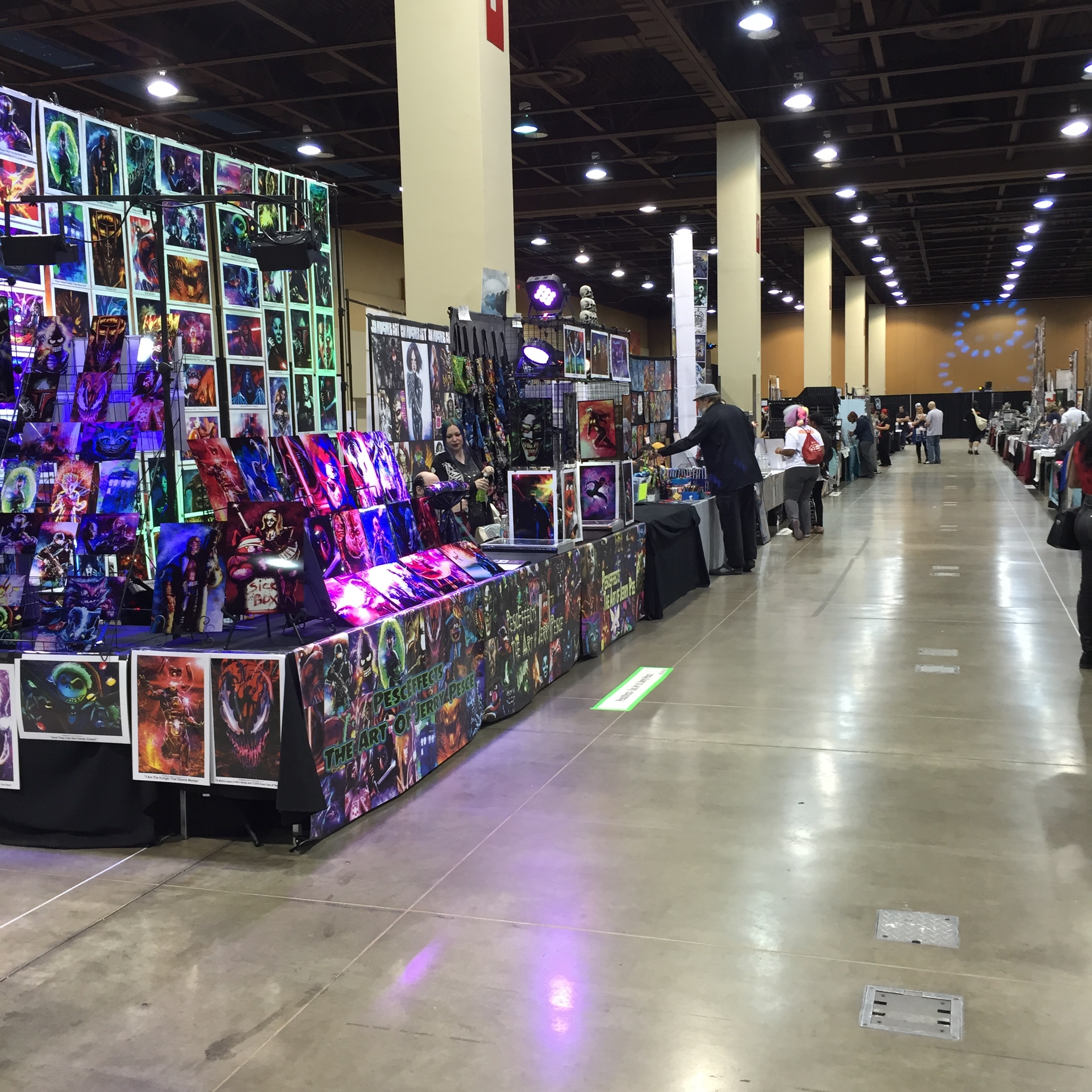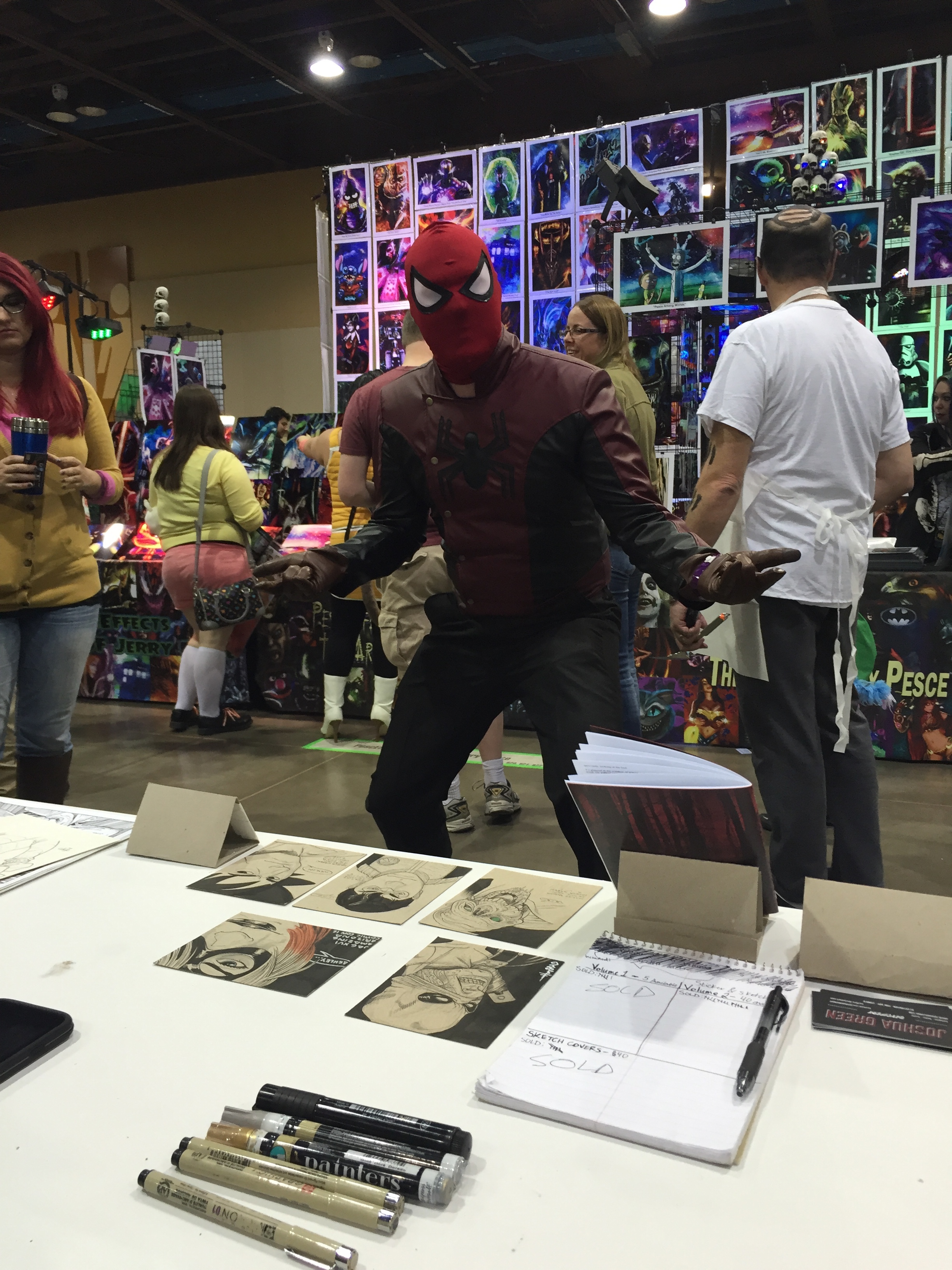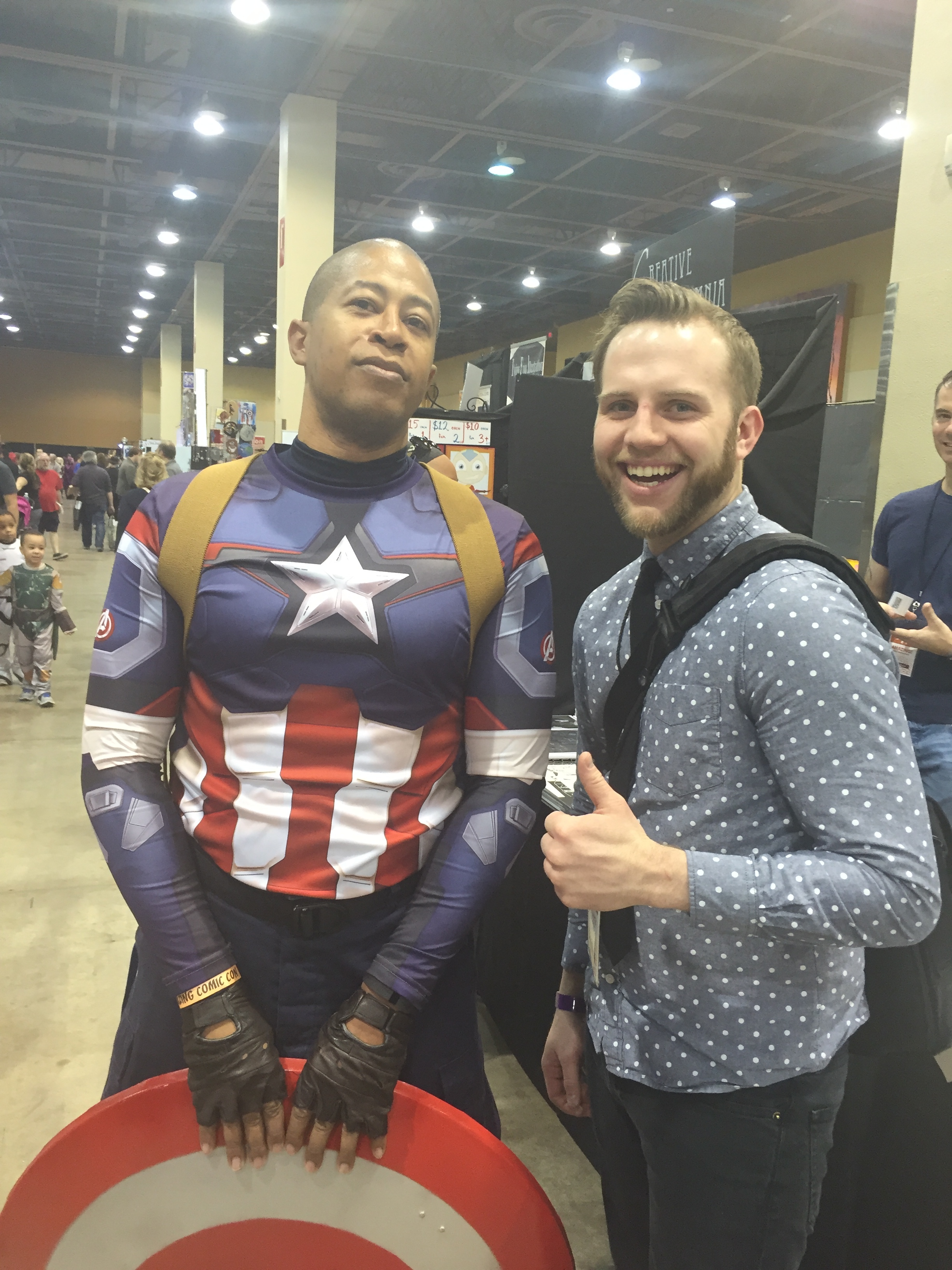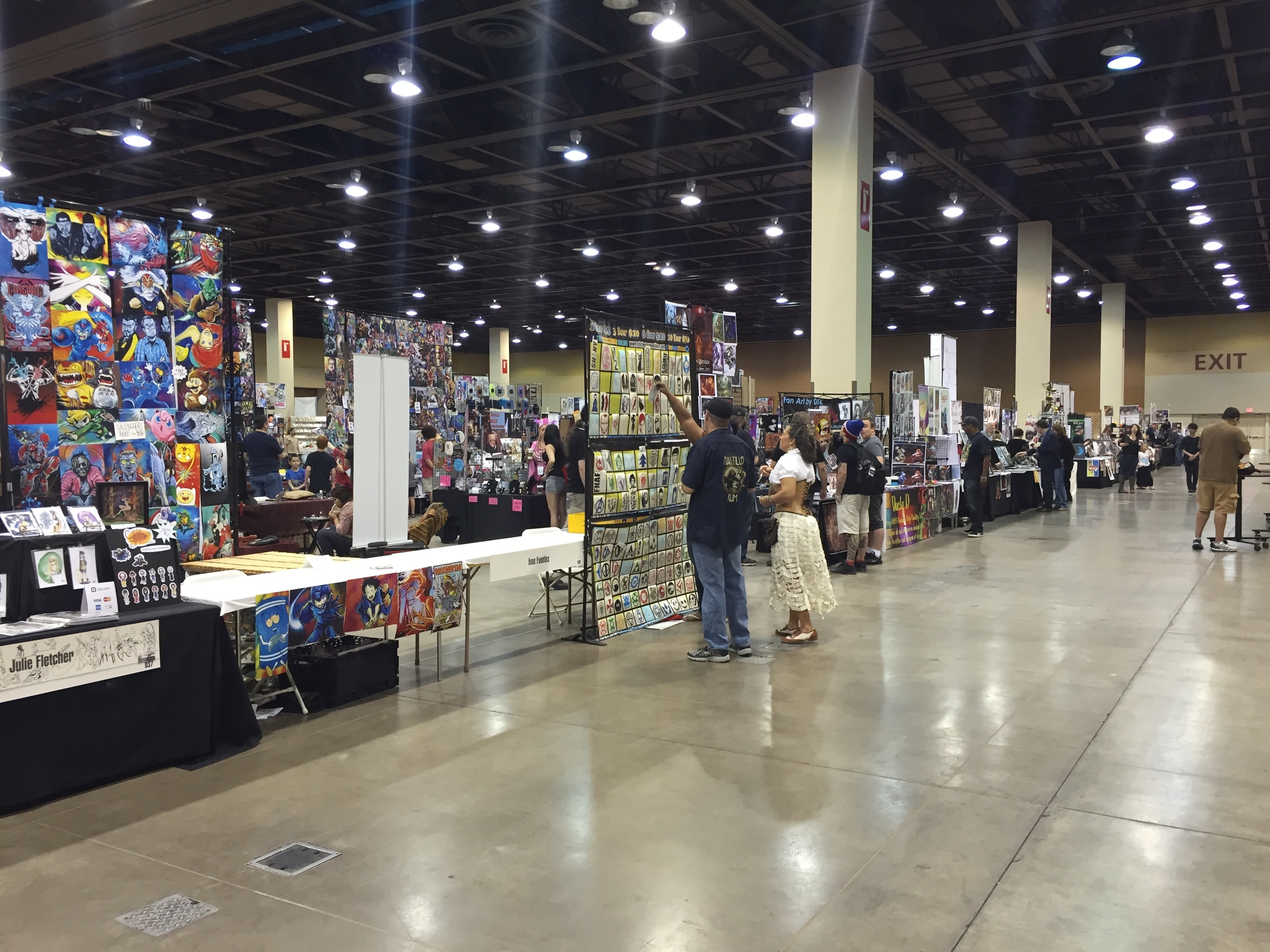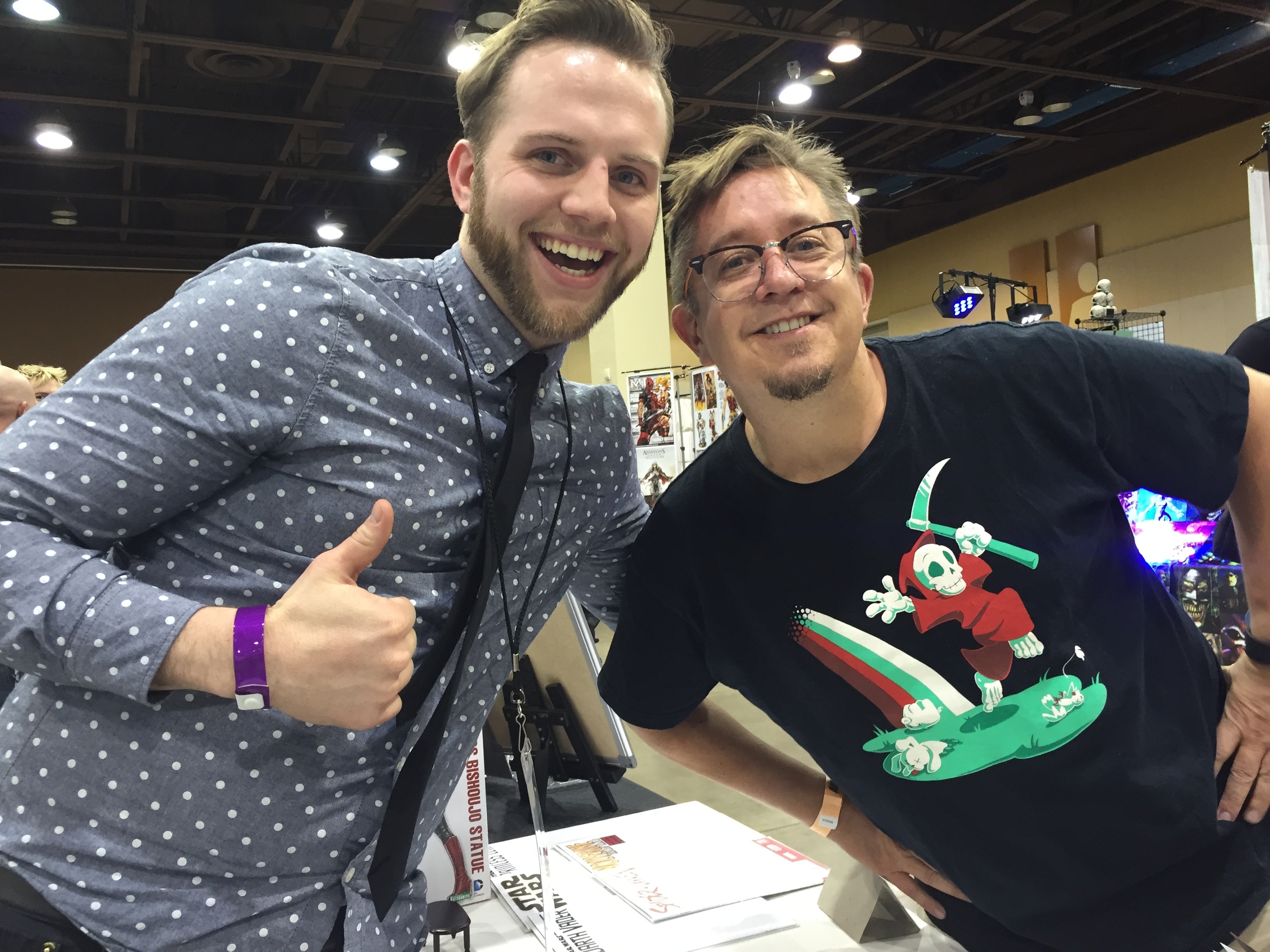RCCCC: From The Odyssey to ODY-C: Re-Making Myths with Fraction and Ward
Sunday, September 12:00-12:50 pm
Topic:
Matt Fraction and Christian Ward have re-written one of the fundamental epic myths of Western culture in ODY-C- and in the process have produced a book that looks and reads like nothing else on the stands. Join the creators in this discussion on this book.
Panelists:
- Matt Fraction, Christian Ward, Professor Ben Saunders
Discussion:
Let us jump straight into this discussion by saying I think Matt Fraction is a powerhouse of a writer and a real inspiration for anyone looking to write in comics.
Ben Saunders the moderator of the panel starts by asking Matt why he wanted to work with Christian Ward (Note this quickly became a cute back and forth of compliments to each other). Matt basically concluded with saying he saw Christian Ward on all these projects just wanted to take his work and really let it out, he wanted Christian the "stallion" to let loose and be epic because this story was going to be epic. By epic I mean issue 1 came out with an 8 page foldout image.
Once the egos of each artist was stroked the rest of the panel was discussion the approach of adapting The Odyssey into a futuristic female lead version in ODY-C. For those of you who don't know First was Matt Fractions approach to writing the story, ODY-C is written in Matt's best attempt to write dactylic hexameter (closes to Homer's Odyssey) which basically no one uses anymore and add a level of creativity that ad to telling this epic tale. I can't explain how thorough Matt is when it comes to writing and on this book he wanted to go all out.
In Matt and Christian's version of the story Matt wanted to be able to tell a tale his daughter could read and believe in the heroes (not the male misogynistic tales from the past) so the world is gender bent and even the gods are androgynous(turns out the story is violent and his daughter can't read it but that was the start for him).
Briefly, let's discuss Christian Wards epic art for the book. His goal was to top him self each issue and expand and create and reinvent the page every issue. The book feature huge sprawling scenes and panels that look like art that could hang on a wall. My favorite thing he did is the gods; In this book the gods stand above the panels and outside the world of the book almost breaking the fourth wall( they also don't speak like the rest of the book) they act on their on and its such an ingenious was to tackle gods in this myth.
Full disclosure I read ODY-C and couldn't get into it because its hard to follow there is a learning curve but after this panel I want to read it and try because it was an amazing creation these guys have made.
RCCCC: The Convention
Rose City is a relatively smaller convention for being such a Comic based city.
The attendance for the convention has been growing for years with 32k attendees last year and around 50k this year. But with guests like Stan Lee and Jon Bernthal its easy to see why.
That all being said here are some photos of my experience at the convention (click through the pics):
RCCCC: Spotlight on Greg Rucka
Saturday, September 10th 1:30-2:20 pm
Topic:
Multiple award winning writer currently writing such blockbuster hits like Wonder Woman, Lazarus, Stumptown and Black Magick. Wonder what makes one of the best writers in comics tick? Come find out.
Panelists:
- Greg Rucka
Discussion:
First things first, I felt so lucky to see a panel spot lighting this man, his work in comics has been huge and hearing how he tackles projects was like getting to see how a magic trick is done.
This panel featured Greg Rucka being interviewed by one of his closest friends (whose name escapes me). The panel starts by addressing that a few years back Greg has a public outing when he left DC comics, but since then he has come by to them and as mentioned currently writes Wonder Woman. This was brought up because admittedly Greg writes from anger or rather he can and often has written from anger and currently his Wonder Woman book is hopeful. Greg Rucka explains just cause I have and can write from anger doesn't mean I am angry all the time.
Greg then spend a majority of the panel explain his approach to working on the current run in Wonder Woman for DC. The most important thing isn't being continuity driven but is simply on how you approach the character (this goes for any superhero story). The approach for Wonder Woman is to ask what is she and what make Dianna tick. Greg says the "wonder" in her name isn't for wonderful but for the true meaning of wonderment and curiosity, with that being the prime factor it was easy to make Dianna decisions and make her level her paradise to save the world and wonder how everything else works.
The panel continued but in that moment when Greg is on stage talking about the detail of Wonder Woman ( a fiction character) he revealed just the level of care and how serious he takes writing and that carries on into all of his amazing works.
This was a an amazing 50 minutes. I highly recommend picking up any and all of his work. As a creator working his way up from self publishing my own comics to working in the industry I strive to understand and learn on how to create better stories. Greg Rucka looks at fiction and makes it real, he take principals of life and applies them to all stories he tells and like a good writer he studies and researches. The level of care he has is what I aim to do in my own writing.
RCCCC: Queer Comics Take Over the World
Saturday September 10th, 11:00-11:50 am
Topic:
Join LGBTQ comics editors and creators in a discussion about mainstream and indie queer comics and the importance of queer representation.
Panelists:
Taneka Stotts (Beyond), Ari Yarwood (Oni Press Managing Editor), Genue Revuelta (Love & Sprockets), Terry Blas (Briar Hollow), and D.J. Kirkland (Black Mage).
Discussion:
This was one panel I did not want to miss ( and obviously I didn't) but it is important right now with the changes that are happening in the industry for more diversity that I got a chance to hear from some creators who are actively in the industry.
The panel we over a great many problems with the current climate of diversity in media let alone LGBTQ. I was able to get a few tips and messages from this panel that truly speak to what creators are looking for in the industry.
First Taneka Stotts mentions, what not to do when writing, "Don't think having ONE conversation with a trans, gay, black person means you're an expert on their experience." As someone who is a straight white male, I take this message to heart because when it comes to creating I don't want to come off wrong of that I know everything.
In my opinion the most important piece of information I got form these wonderful panelist about the current climate in the industry was Taneka saying, "Pay attention to indie creators who already make queer comics." I don't want these huge companies to just just of boxes of "diversity" to reach some status, instead use the amazing diverse creators already out there.
Last tips about creating stories from LGBTQ creators and editors:
- make the stories about stuff you like and want to tell and inject it with your uniqueness
- Some times its about being a BOLD LGBTQ book and others its a BOOK with LGBTQ content
I think its great to hear creators actually speak about their content and remind everyone that stories have diversity its that simple.
RCCCC: Editing Comics: Where the magic happens!
Saturday, September 10th 10:30-11:20am
Topic:
With the shifting landscape of comics today, this is your invaluable guide to breaking into the industry and working with a powerhouse publisher. Join Dark Horse Comics editors for a rare behind-the-scenes look and share the secrets of building a successful comic.
Panelists:
- Katii O'Brien, Cardner Clark, Freddye Miller and Hannah Means-Shannon
Discussion:
The panelist at the panel are all current editors at Dark Horse and wanted to share what they look for when taking the creators work and getting it to the next stage of publishing work.
The first thing that was address is making sure the creator is knowledgeable about comics and more importantly story. In order to make a comic you must understand story structure. This being said they suggested that creators read, and read outside of just comics. Read three act plays and scripts to understand how story and plot unfold.
Next part was with the comic itself. When creators (artists and writers) are working on a book make sure the scene avoids "Double Action" a term used when a character is described as doing two things at once. Double Action works in film but not on the comic's page. The editors continued to describe and emphasize the importance of telling a solid story and making sure the book has flow.
The last point addressed at the brief panel was the "Market" by that they mean who is the audience of the book. Before any approval by editors they must first know; who,how and where to market and promote a book. The creators when pitching should already understand who they aim to please for the market (while still acknowledging its can be unpredictable). But companies and the editor cannot take a project until they know how they can sell or market and best showcase the stories they want to share.
I wish the panel was four hours and they could discuss even more about the marketing of a book or common problems that occur with new project but I am happy to take the information provided and apply it to my own creations.
Geeks Rising at Rose City Comic Con (Portland) 2016!
That time of the year has come, its another Comic Convention. The Rose City Comic Con is held in Portland OR where staff writer Logan (me) has just relocated and as always I will be doing my best to provide in depth insight on the different panels that are at the convention.
My hope is to see tones of creators and professionals of their crafts discuss and provide information to fans and people like me who are just starting out. More information will be coming as this con is set on September 10-11th.
Until then here are a few guests and people worth mentioning:
- Stan Lee
- Aubrey Aiese - LumberJanes
- Gabriel Ba- Daytripper
- Brian Michael Bendis- Marvel Comics
- John Bernthal- The Punisher
- Chad Coleman- The Wire, The Walking Dead
- Phil Lamar- Various talents
- David Yost- The Blue Power Ranger
You better believe I am going to try to meet all these amazing people and more!
PHXCCC: Fan Art, Fair Use and Copyrights
Saturday, June 4th 10:-11:30AM
Topic:
Geek lawyer Ruth Carter discusses how copyright law intersects with fan art and fan fiction. Find out what you can legally do and what is likely to result in a cease and desist letter or lawsuit.
Panelists:
- Ruth Carter
Discussion:
This was one amazing panel. Ruth Carter is a lawyer who comes to conventions to speak about copyright, fair use and potential of problems.
Her number one answer for problems that come up with comics and geeky cases is, " It depends." Why? Because when it comes to the law and who is at fault it really does become a case by case issue. First disclaimer: this is my recounting of the panel and all legal advice should go through the proper channels, with that being said here is what I picked up.
When it comes to COPYRIGHT you have the ability to protect and control the following:
- Display (Comic images and cover)
- Distribute (Issues, books, movie, etc.)
- Perform (Dance, Play, Musical)
- Derivative works (This is the grey area) (EX. Stars wars has copyright on Posters, Bikinis, deathstar cupcake mold).
Copyrights last for the lifetime of the author/creator plus 70 years or if its an LLC its 120 years from date of creation.
The rest of the panel dealt with Fair Use. If you are an artist who makes prints of already owned IP you might be protected under fair use or you could be walking on thin ice but with fair use of creations there is no black and white.
Ruth uses the acronym PAIN for ways to find out if you are under fair use.
- P- Purpose and character of your use.
- A- Amount of the original used. ( is it a shot for shot copy?)
- I- Impact on the market ( would someone seeking out the original take yours as an equal subsitute?)
- N- Nature of the work (What did you copy)
For something to be considered protected under fair use it must be unique enough and transformative. By transformative I mean it has to be, lets say, an oil painting set in the victorian era of a cartoon. Something that is not in the original format of the IP. Also parody falls into fair use but satire doesn't automatically.
This was just a splash into copyright/r fair use and I highly recommend you check out the rest of Ruth Carter's work as well as contact someone for proper legal counsel if you have real concerns.
Follow Ruth:
PHXCCC: Spotlight on Arryn Zech
Friday June 3rd :30-5:30PM
Topic:
Arryn Zech is an American actress best known for her role as Blake Belladonna from RWBY. She also voices the character Dr. Emily Grey in the longest running web-based series "Red vs. Blue," created by the Austin based production company Rooster Teeth. With a background in theater and classical voice, Arryn is now based in LA pursuing her career in film and television.
Panelist(s):
- Arryn Zech
Discussion:
I am a long time fan of Rooster Teeth Productions, this icluded everything they have done from their podcast, achievement hunters, RT Life, and ofcoarse Red vs. Blue. I am also a huge fan of voice acting, so you can imagine I was excited for this panel.
The panel started with her with a brief introduction to Arryn Zech for those who might not be aware of who she is. She also immediately acknowledge how lucky and happy she is to have the fans she does and to play such big characters. After that it went into a Q & A from both the moderator of the panel and people standing in line at a microphone.
Here are a few things that were asked and I learned about from the panel. First thing that was brought up was getting ready for the role of a character. Arryn says, you need to find a way to connect the the character your playing. Though not all characters are relateable in the traditional sense, it is important to find a thread you can connect with and you start to understand the character. You must find what makes the character true to you and believe in that, then it just gets easier with time.
The second bit of advice came from the question "What do you do to learn an accent?" Arryn says she watches youtube and recommends getting emerished in the voices, weither that is watching youtube or surround yourself in the environment of the accent. She also recommends youtube for practice anyway.
The best thing a person wanting to voice act can do is to make a reel (an audtion tape). From their its about taking acting lessons. Just because you arent seen doesnt mean you don't need to know how to act. Take classes and learn as much as you can.
I found that was the biggest reveal to me, was you need to rmember youre still acting and that a little bit of theater can help with voice acting. But it comes down to putting in the effort and taking it seriously.
- You can find Arryn Zechs work here.
PHXCCC: X-Philes Live On
Topic:
On Friday, June 3rd 2016 at 1:30 pm, those who still want to believe descended on Phoenix Comic Con. The conspiracy theorists, and FBI's most unwanted met up to discuss their favorite episodes, the relevance of X-files in the current age, and answer some fun trivia questions.
Panelists:
- Eric Downing
- Hayley Tracy (@hayleytracyaz)
- Lee Payne
Discussion:
Being that this was a fandom panel, where the main focus of the panel was discussing favorite episodes, and answering trivia, I figured I would approach this article in a different way. I do not think that transcribing the discussion would do this panel justice. I feel like the best way to capture the true spirit of this panel would be to act as an additional panelist and discuss my favorite episodes.
Clyde Bruckman's Final Repose
This is an episode that shows up on every top 10 list and there is a reason. The main focus of the story is around Clyde Bruckman, an insurance salesman who can see how people die. The interesting twist is that the monster of the week in this episode is also a psychic, so you end up with some interesting interactions that would otherwise be impossible. However, the x-file in this episode is not what won an emmy; the excellent writing and believable nature of Bruckman's misery is what won it that award. The loneliness of Clyde is undeniable in the script and is then cemented by Peter Boyle's performance. One of the highlights is when you see the witty back and forth that Bruckman shares with Scully while sitting together in a motel room. The story is a near perfect portrayal of a lonely man looking for any connection with another human. There is some light at the end of the tunnel though because I like to think that he found that connection, however briefly it might have lasted.- Sleepless
In this episode, we follow a group of Vietnam veterans who have been experimented on by the government. The experiment was conducted in order to create a group of soldiers that would never have to sleep. The procedure consisted of removing part of the brain which tells the body that it needs rest. While in Vietnam, this group of modified special ops soldiers were some of the deadliest in the war. However, twenty four years after the war has ended, without one hour of sleep, a single soldier decides to take revenge on those responsible for his pain. Although this may not be the most plausible of x-files, it is one of the most interesting to think about. We know that the government has the scientists to carry out experiments like this. We also know that if certain experimentation provided a tactical advantage, it would be difficult for the military to ignore. That just leaves the one question; is the government conducting horrifying experiments on their soldiers?
- Musings of a Cigarette Smoking Man
The reason this episode is in my top list is because we get some really interesting backstory about The CSM (cigarette smoking man). Throughout the episode we see how the CSM shaped the modern day world, whether it be the JFK assassination or the MLK assassination. To me, this was very fun to see, but the most interesting part about this episode was the discovery of CSM's passion. He wanted to be a writer. The moment that sold me on this episode is when after years of submitting stories, and years of rejection letters, he finally gets accepted to a magazine. He types up a resignation letter (to whoever CSM's boss could be) and goes to the newstand to pick up a copy of the magazine that contains the story. Once he realizes the magazine altered his story, turning it to crap, he is heart broken. He ends up tearing up his resignation letter and leaving the magazine on a bus stop bench. I believe that this is a pivotal moment for the character. This was the death of his last bit of hope and humanity. Without this rejection letter, I do not think that the X-files would have ever come to be.
Conclusion
I think that this panel is a perfect example of why comic-cons are such special events. In the real world, I only have one friend who is interested in the x-files. The remainder of my friends simply do not understand or appreciate the masterpiece created by Chris Carter. But for this one hour, on one day, I was surrounded by 100 people who share the same passion as me. A group of new friends. A group of fellow X-philes who I can chat with about my favorite episodes, or deconstruct the subtext of Mulder & Skully Meet the Weremonster, without having to worry about a confused look coming across their face.
This was hands down my favorite panel of the entire weekend, and I hope to see these folks revisit their panel at Tucson Comic Con in November.
PHXCCC: Do You Even Podcast? Panel
On the last day of Phoenix Comic Con 2016, Logan from The Paper Robots, Matt from Absolute Geek Podcast, & Bandrew from The Bandrew Says Podcast ran a panel titled "Do You Even Podcast?".
In this panel, they briefly touched on their podcasting motivations and history, and then dive into Q&A with an awesome audience. The topics covered range from what's the best audio gear to start a podcast with to how do you host your podcast to how do you prepare for a podcast episode. If you are new to podcasting or if you plan on starting your own podcast, this is a must watch.
PHXCCC: How do I pitch my property?
Friday June 3rd 10:30-11:30am
Topic:
Whether to a publisher, a TV network, a studio, or a production company, your work won't sell itself. Pitching is more than just telling the plot or your comic book, graphic novel, television, or movie idea. In an extremely short amount of time you must convey the meesage of your project, get the listener emotionally invested in the story, and explain why your property deserves to be developed instead of the hundereds of others. The panelists will walk you through the six parts of a good pitch, with pratical advice on how to be clear and compelling.
Panelists:
- Douglas Eboch (Screen Writer)
- Joshua Blaylock ( Writer Devil's Due Comics)
- Ken F. Levin (Co-Founder of First Comics)
Discussion:
Though the panel went by faster than hoped this group of professionals in their fields provided a lot of great points for pitching you porject to publishers. The majority of us listeners were there for comic publishing so the focus was centered around pitching a comic property.
Ken F Levin provided most of the information as he has been in the undustry the longest and done everything from pick a creators project turn it into a comic to helping bring the comic "Road to Perdistion" to the big screen. He broke it down into four points. Keep in mind this wasn't how to get started this is for people looking to sell there already made project or nearly finished property. IE: A on going comic series or graphic novel.
- Decide what your project can be.
This means can your comic be adapted to a cartoon or does it warrant an hour long drama. Is it a movie, or videogame.
- What's you dedication?
Decide what you want your porject to be and how dedicated or "married" to that idea you are. Ken says once you sign the papers you give up your vote. So you need to sell the property and make the people looking believe what you believe. This brings us to the next point.
- Test run your pitch./Pitch to the least likely of people.
Once you know what you want from your property or project you need to start learning and practicing how to articulate it to strangers and potential publishers. If you can find friends you that don't already know your story just verbally pitching it to them and see if they get it. This will help focus your idea and make it as clear and simple as possible. The next part of this is find publishers you either think they won't take your idea or you don't want them too. This is a great way to get in the room and have actually companies ask questions about your property, this is a trail and then you will hopefully learn what else needs to be improved on.
- Always have a face to face meeting.
Ken says as someone in the undustry you can believe or trust something or someone is real without a face to face. Face to face can inlcude skype or a face time live chat but what he is trying to explain is that once you put a project out there you can get spammed but "publishers" and to be careful. You have people contacting you which is a sign of value but others might just try to be buying your idea for as cheap as possible.
I wish the panel went more into detail about the earlier stages of publishing but this was vital information regardless.
Geeks Rising at Phoenix Comic Con 2016
Announcement!
Phoenix Comic Con is happening June 2-5 and that is just a month away. As usual Geeks Rising will have it's Con Coverage of panels through the weekend.
Details of coverage will follow in the passing weeks but we have one more thing that is happening.
Do You Even Podcast!
Geeks Rising is hosting a Podcast Panel with The Paper Robots, Podcastage and Absolute Geek Podcast. The Panel is about breaking into podcasting, we will be providing tips and tricks we have all learned and answering the audience's questions.
- Check out the details here: Do You Even Podcast!
AACCC: Exhibit Hall
Amazing Arizona Comic Con has come to an end but the coverage is still going on. Over Valentines's Weekend I had the chance to explore downtown convention center for Comic Con and I was lucky enough to meet fantastic artists, writers and voice actors. Over the next few days you'll get to read about some of the amazing panels that Amazing Arizona Comic Con had to offer.
Until then here are some images from the exhibit hall.
AACCC: Amazing Arizona Comic Con 2016
It had only been a month and here we are for the second convention of 2016. This weekend at Phoenix Convention center in downtown Phoenix, Arizona is the 6th annual Amazing Arizona Comic Con. The convention runs two and half days of programming and events from Friday 12th - Sunday 14th.
This con has amazing guests no pun intended, but the line up is full of talented artists and writers and creators; Kevin Eastman, Chris Claremont, Rob Liefeld, George Perez, Ryan Ottley, Kyle Higgins and more like a fashion show, cosplay contest and anime.
Here are some panels Im excited about through out the weekend.
Friday
Arrival
"Waiting Nightmares 2" Comic Book Release with Logan, Joshua and Tania
Saturday
10:30: Kevin Eastman signing (TMNT)
12:00: Captain America with Steve McNiven and Charles Soule
2:00: TMNT Q&A
3:00: This is X-Men with Chris Claremont
4:00: Writers Unite
5:30: Amazing Fashion Show
Sunday
12:00: Marvel Mutant Mayhem
1:00: Amazing Geek Fashion
3:00: The Voice! (Voice Acting Panel)
Now not all panels will be covered but you can expect lots of photos and article covering this con over the next week following the con.
DCC: Logan Goes to Designer Con
Logan here. I had the chance to visit this awesome convention because I know cool people who make cool things. Let's talk about toys baby.
What is Designer Con?
DesignerCon is a convention held Pasadena, CA centered around costuming, designer toys and models. 2015 was the 9th year it has been around, it was founded in 2006 under the name "Vinyl Toy Network." The name changed as the show grew into a bigger and wider reach of toys, collectibles and art in general. So the convention is a show floor with artist and designers coming together to show off their special custom creations and sell you a little piece of unique art.
Designer Toys?
Yes, that is real and yes, it is a broad term. Designer and High end toys are terms to expand what might be referred to as models, busts and vinyl figures. It's independent artists and companies making custom figures that aren't your typical action figure or lego. These "toys" are made from different materials and come in all shapes and sizes. The most common are "munnys" and "dunnys" by KidRobot. There are so many types of toys and figure, much like any art form.
My Experience
Now, some people might know Pop Vinyl and Funko, these are the guys behind all the cute chibi toys of pop culture with big bobble heads. Thats all I knew coming into this show and I knew my talented friend Cynthia of @tentimesatiger made custom toys. What I learned and walked away with was so much more. These creators behind designer toys are true artists, they mold and paint and spend hours on detail for us to buy and set on our desks. But like all artists, they are telling a story and it just happens to be through a toy. I highly recommend you googling some custom toys and see just how amazing these things are.
TCCC: Podcast Advice from Tucson Comic Con
During our Panel
(Left to Right): Zach, Micah, Bandrew, & Logan
As you can probably tell by the coverage over the last few days, Tucson Comic Con happened this past weekend. At this convention Logan & I did our first Podcast Panel. The panelists from left to right are: Zack from Culture Popped Podcast, Micah from The Paper Robots Podcast, Myself, & Logan from The Paper Robots Podcast.
We initially had planned on this panel being nothing more than a discussion of what a podcast is, why we do it, the statistics behind podcast growth and where we see it going. However, after about 10 minutes of background, Logan (who was moderating) decided to go to the crowd for questions. We had a few very active audience members who asked great questions. I will go ahead and share that information with you now. I do want to note that these are all opinion based answers and are not absolutes.
What's a Good Starting Setup?
There are lots of different setups you can start with, and it's hard to summarize into a single starting set up. First, I will say: you can use your iPhone or iPad to podcast. Just use the voice memos app and record. If you want slightly better sound, here's what I would recommend for a single person format:
- Neewer NW-700 ($23)
- USB Audio Adapter ($6)
- Studio Boom Arm ($14)
- Headphones (use whatever headphones you have laying around)
You could have more than one person talking into this microphone, but you will lose some audio fidelity as each person will need to be further away from the microphone, allowing more ambient noise to be picked up. For software, you can use Audacity, a free music recording/editing software. It will not provide the most powerful production options, but it will be a good starting point.
Do You Set a Recording Schedule
Hanging out With the Awesome Panel Staff after our Panel.(Left to Right): Bandrew, OB, Jenny, Logan
For a single person podcast, like mine, it is very easy to schedule a podcast, which is what I do. I know that each week, I have videos to produce, articles to write, and a podcast to record, so I set aside a few hours each week to research and prepare the episode. Then I make sure that on Tuesday (a day before release) that I have about an hour to record the episode. I take another hour or two editing & doing post work on the episode, and finally about 30 minutes to an hour writing the supplemental article/show notes, and scheduling the release in Libsyn.
For a multi-person podcast, setting a weekly schedule for recording & editing gets a lot more difficult. Logan & Micah can attest to this. The way to compensate for the difficulty of scheduling multiple people is to create a back log of episodes. Prior to launching your podcast, record a few extra episodes so you have an episode ready if you have a week where not everyone can record. Or if you have an easy week where everyone can record multiple times, do that, create a back log and store those episodes. The key here is to not miss an episode. Once you miss a single episode, it gets a lot easier to justify skipping future episodes. Don't give yourself an excuse to give up.
How Do You Stick Out Among the Noise?
The first thing that is necessary as a podcaster is to develop and understand your voice. When there are 100 people talking about the same thing, you need to let your listener know who you are as a person and why they should care what you have to say. This is very difficult to do. The way that I did this was by recording a LOT before releasing anything. You shouldn't be afraid to talk into a microphone and record, listen back to it, and critique yourself. Ask yourself, "Do I want to listen to this?", "Is this interesting?" "Would I tell my friends to listen to this?". This technique will not only get you comfortable on microphone, but it can also help find your voice.
Backing up a bit, when you want to talk about something that has been discussed 100 times, you need to come up with a unique take on the topic. Rather than talking about how Empire Strikes Back is the best Star Wars movie, maybe try something along the lines of "Parallels between Star Wars and the Ballets of Stravinsky", or something like that. Mix your knowledge, and bring your own personality and views to the podcast.
When it comes down to it, the most important thing is having your own voice and to not just repeat what everyone else says. However, don't let this discourage you from getting started, it is sometimes cool to hear a podcast from the beginning and witness them grow as an artist as they become more comfortable and confident on the microphone.
I hope the answers to these questions help you get your podcast started. Thanks to Logan for moderating the panel, and the other awesome panelists, Zack & Micah. Also thanks to the Audience who asked such AMAZING questions, and finally thanks to Tucson Comic Con for Having us. Hope to see y'all next year.
TCCC: Cosplay at Tucson Comic Con
The 2015 Tucson Comic Con just happened November 6th - 8th, 2015 and the Cosplay was great. I have included a few photographs of cosplayers that I saw at the convention.
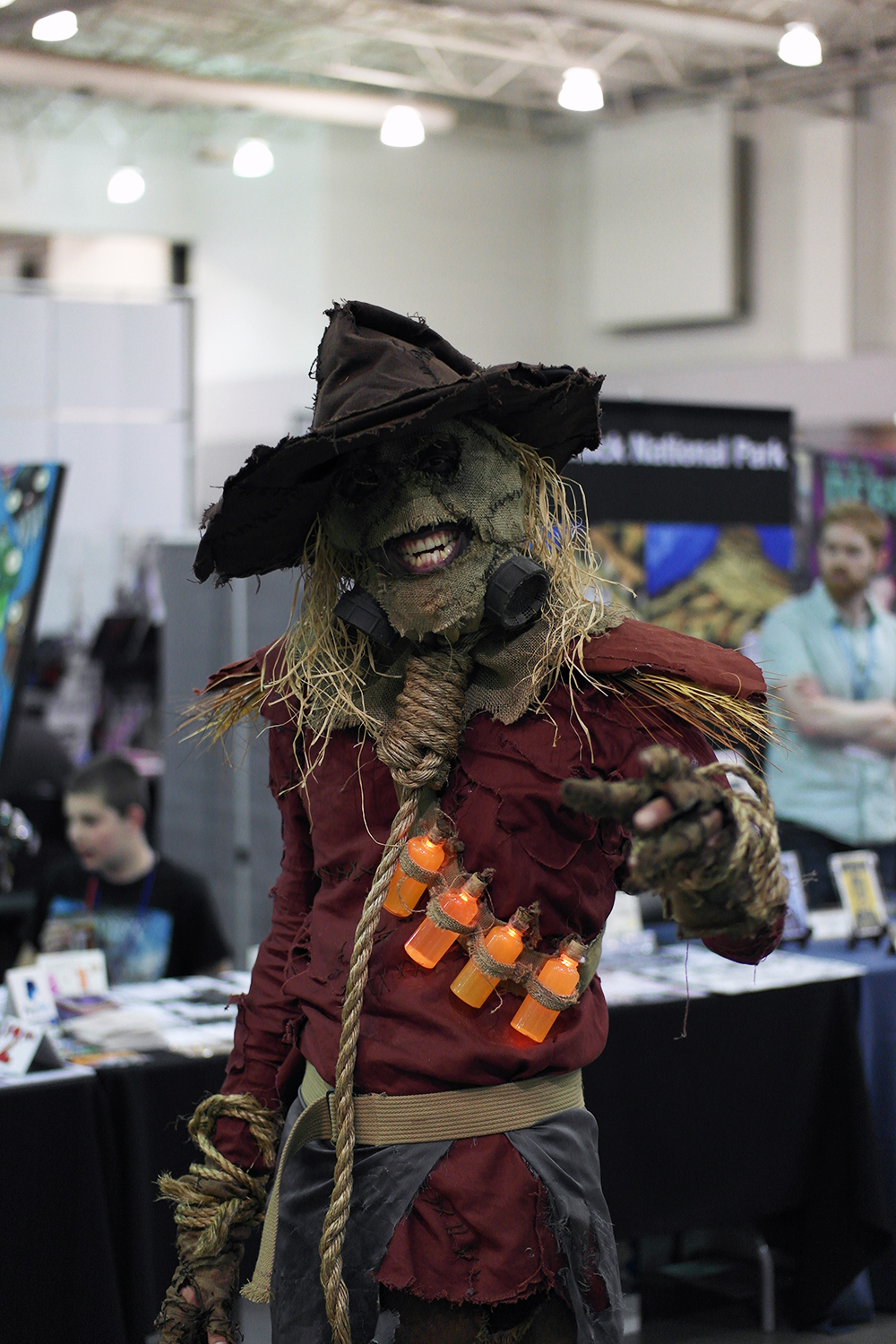

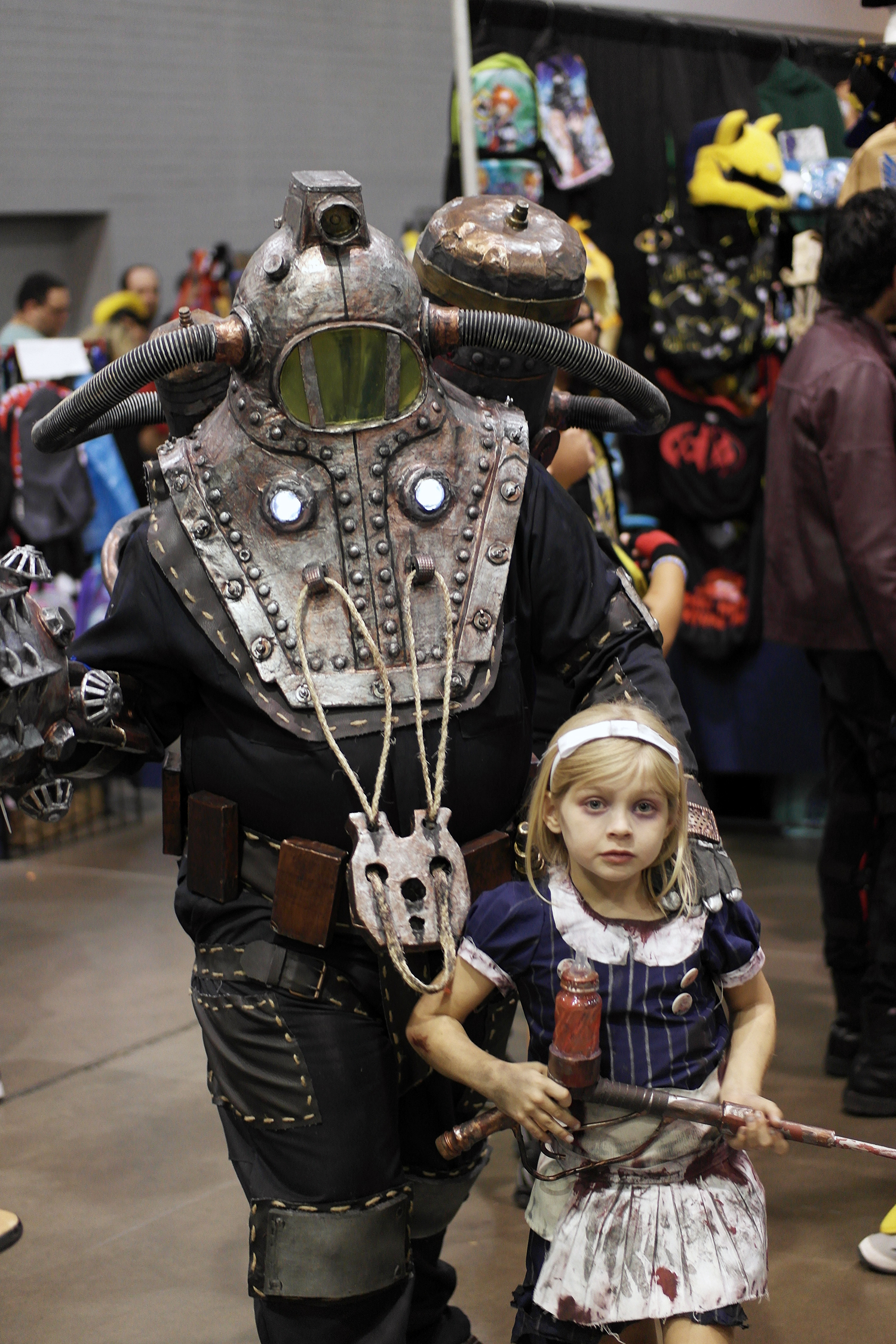

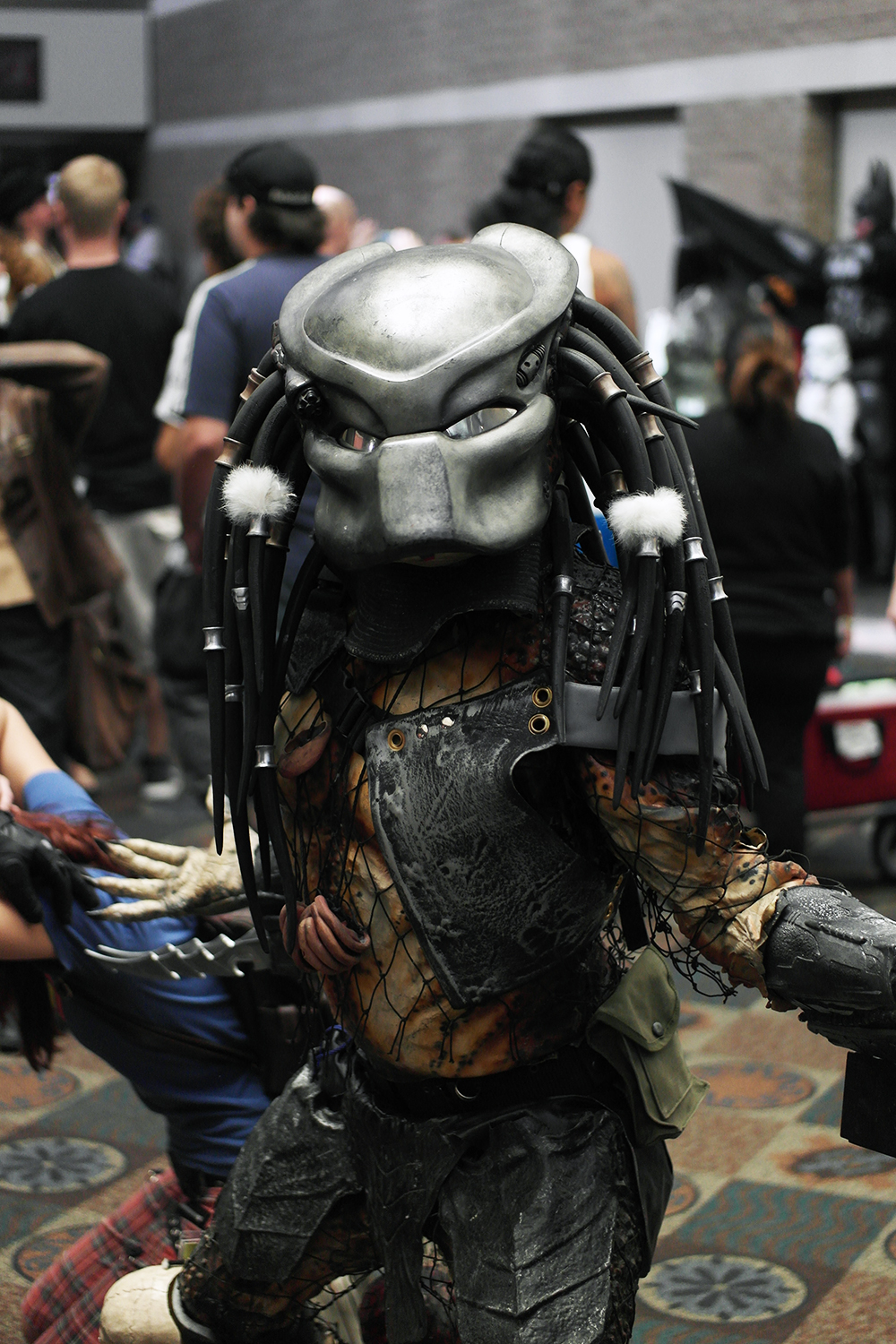

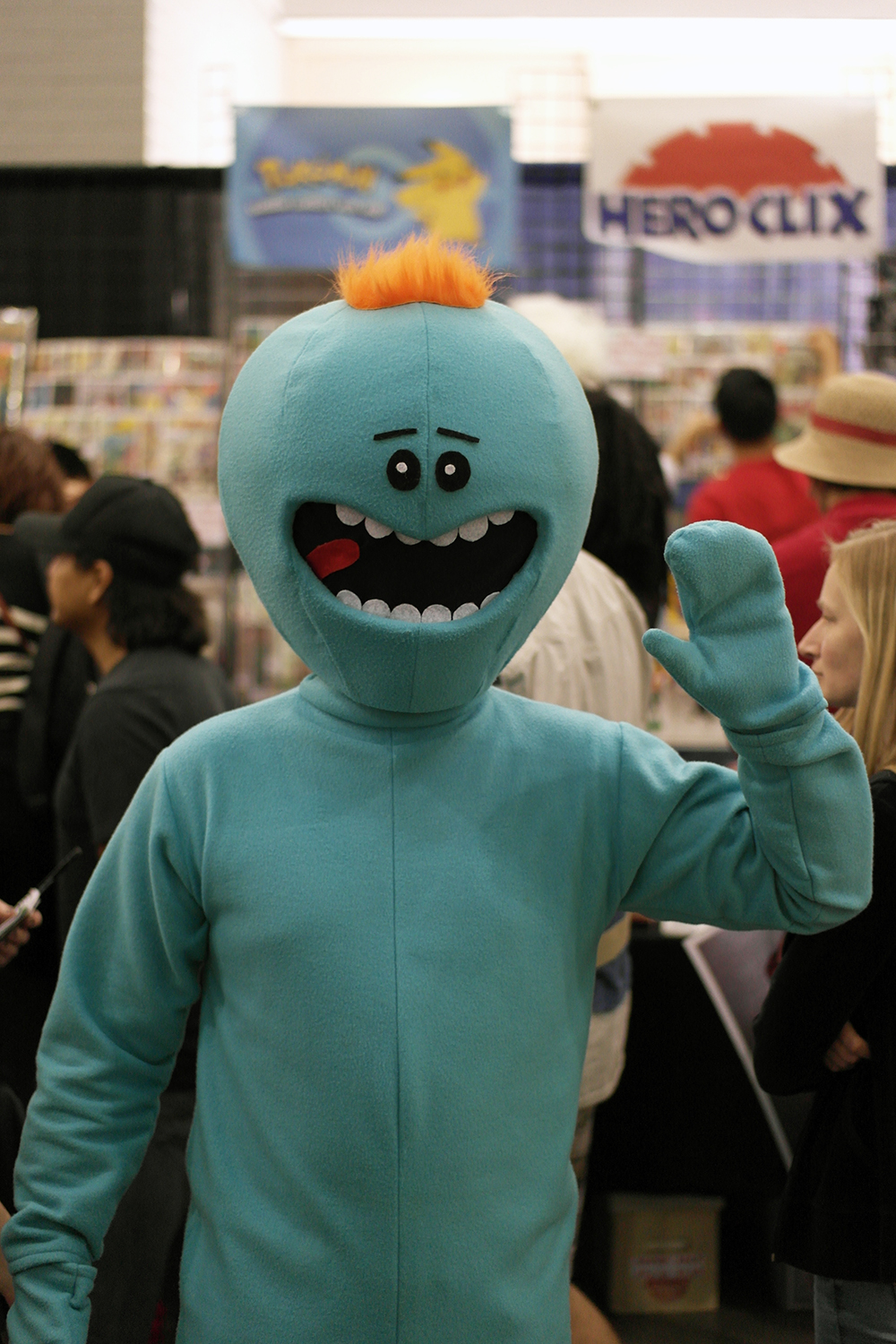

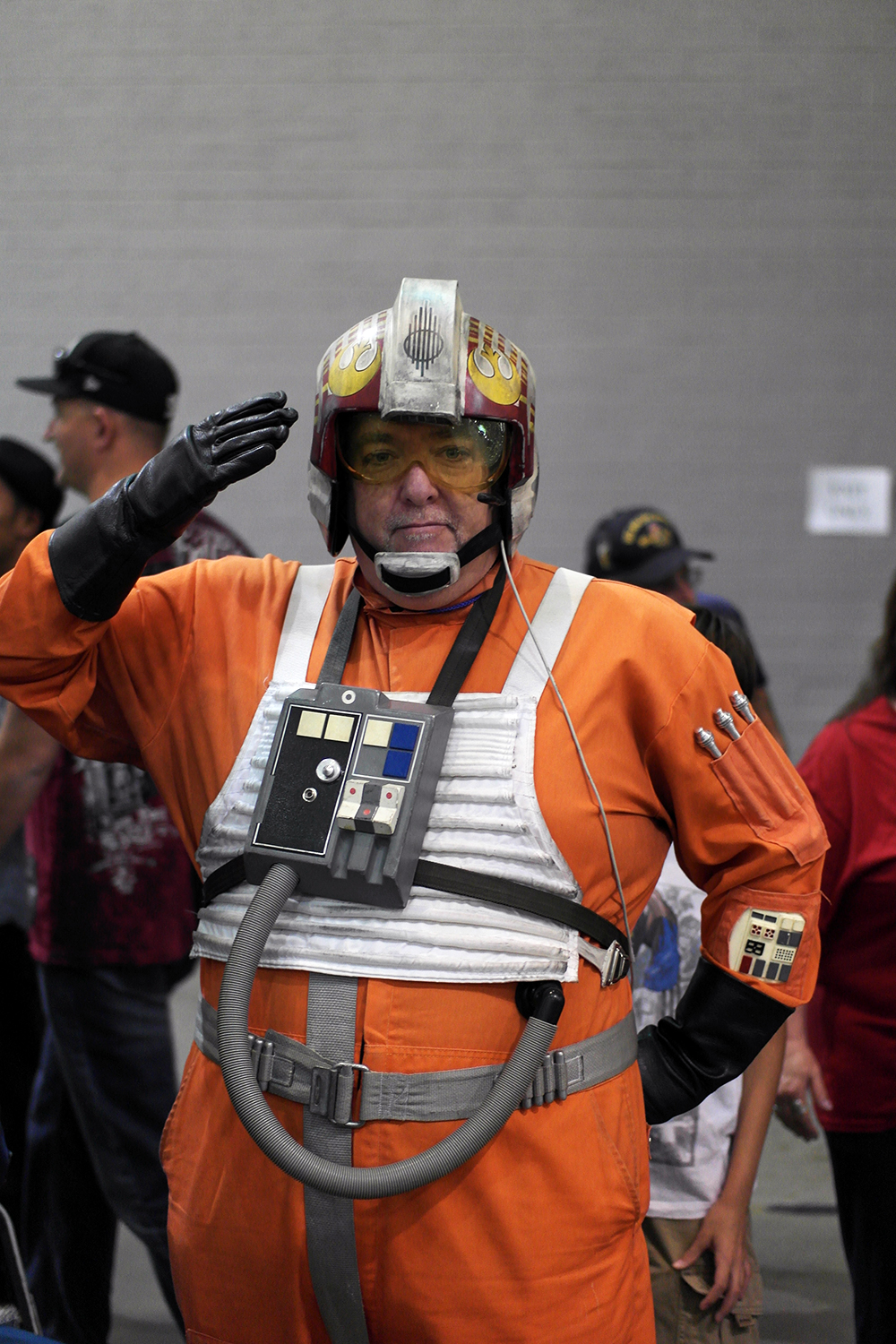

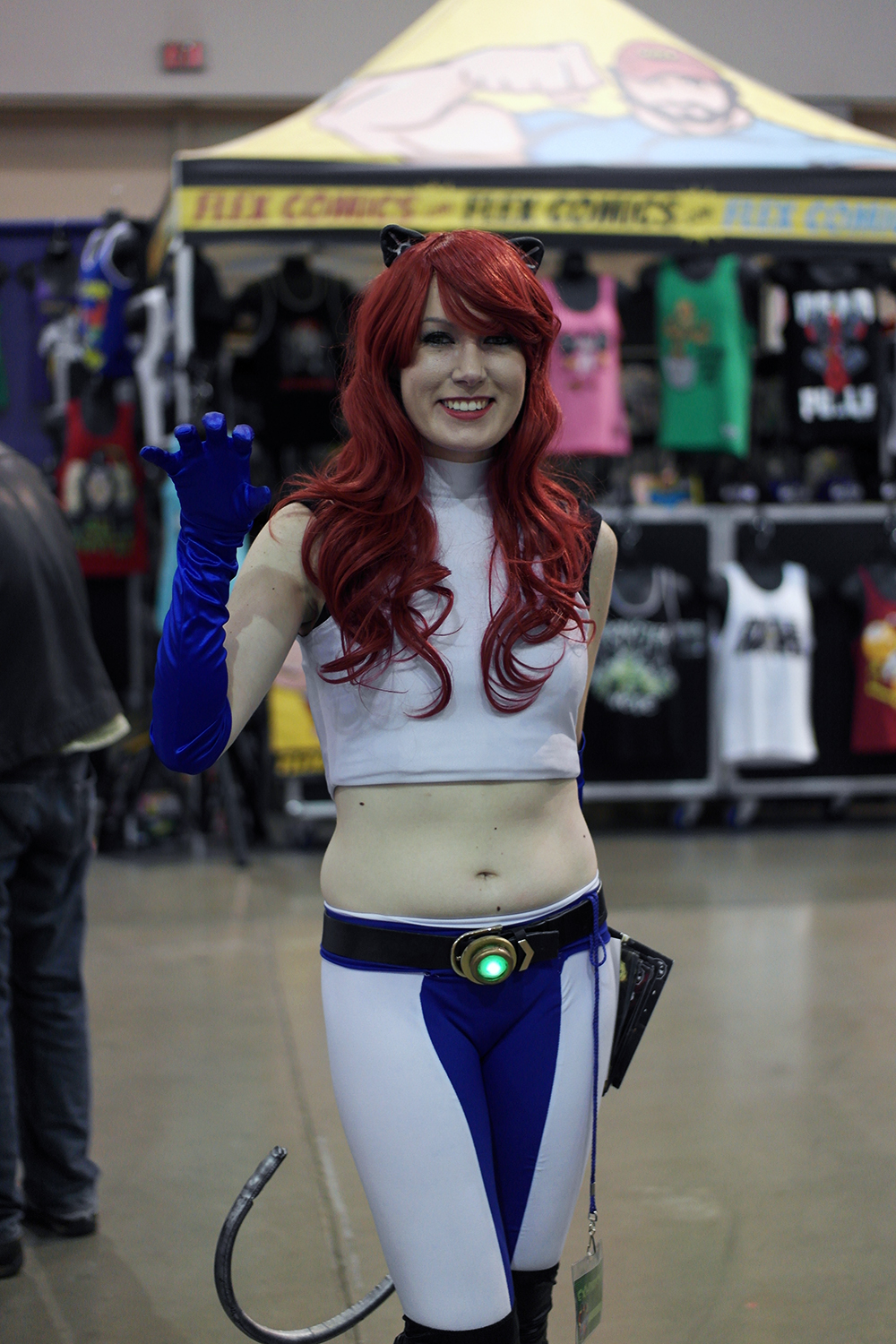

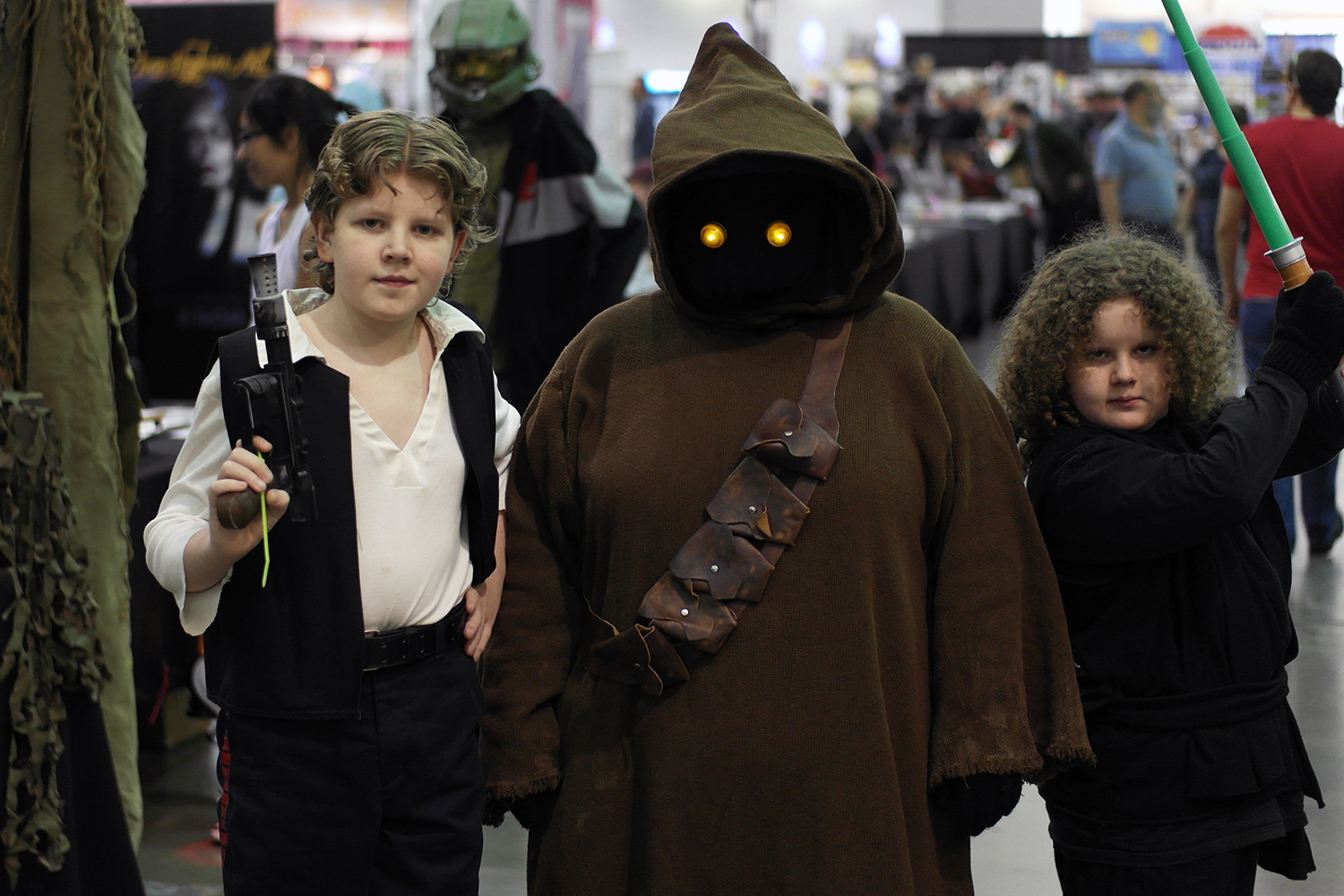


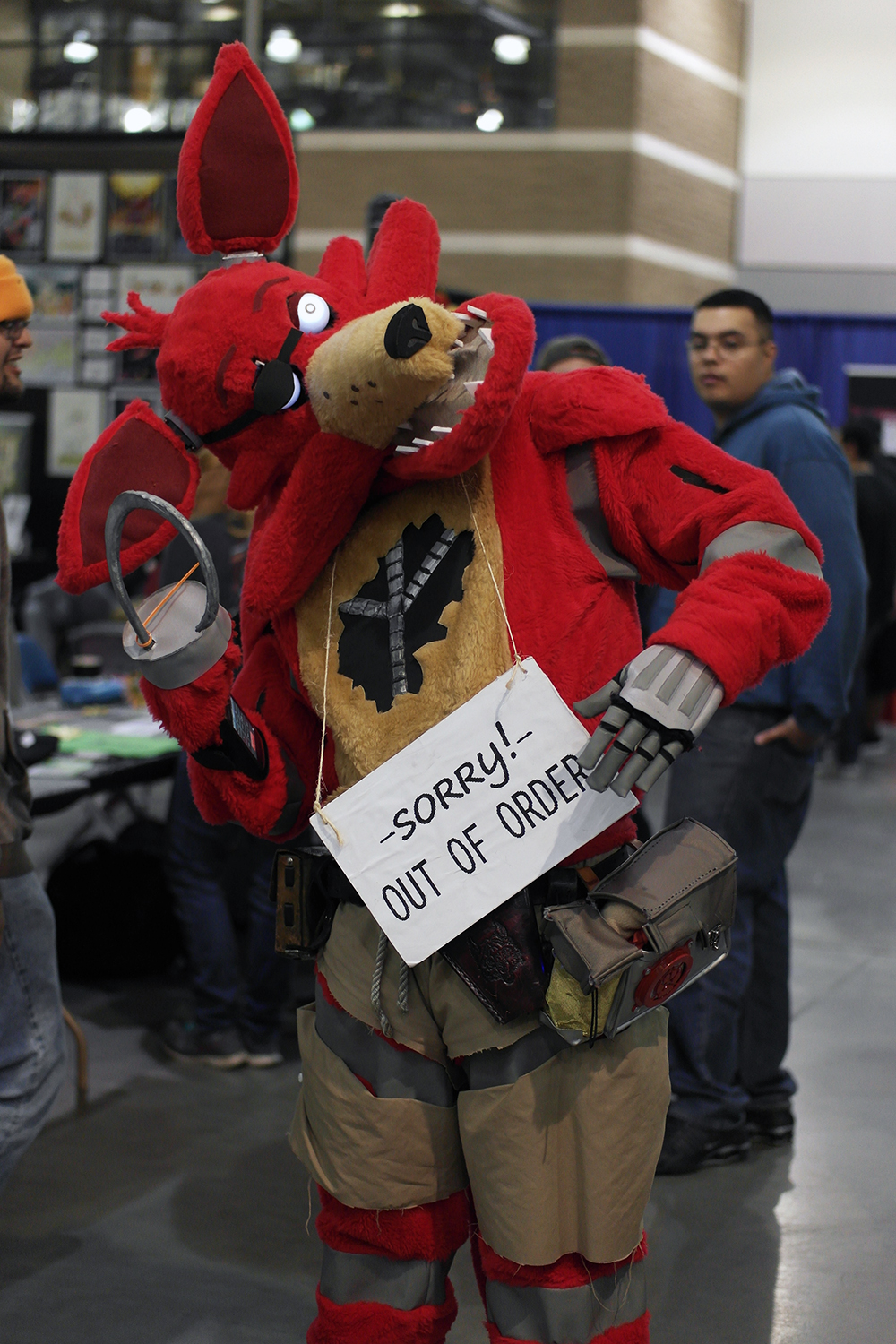

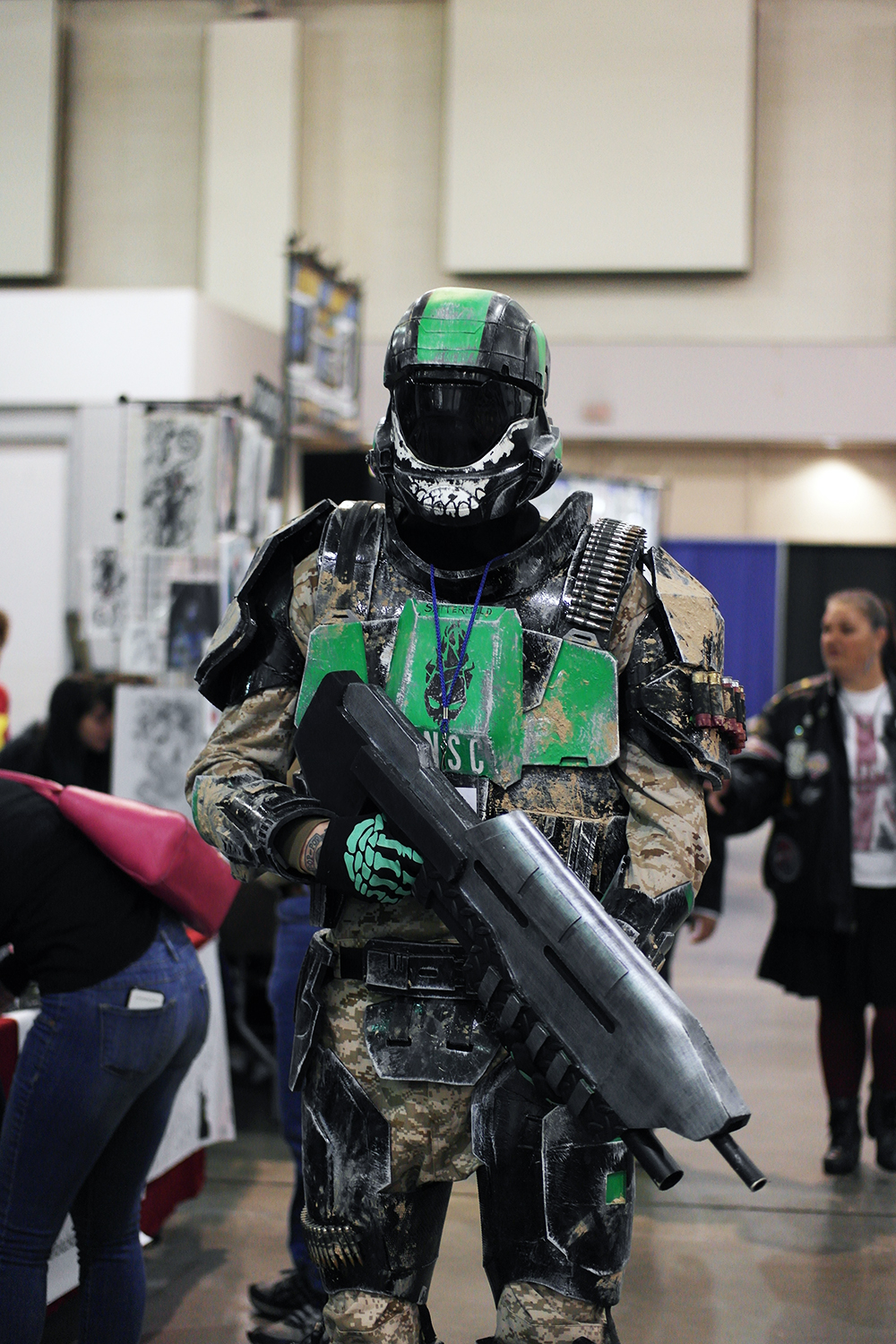

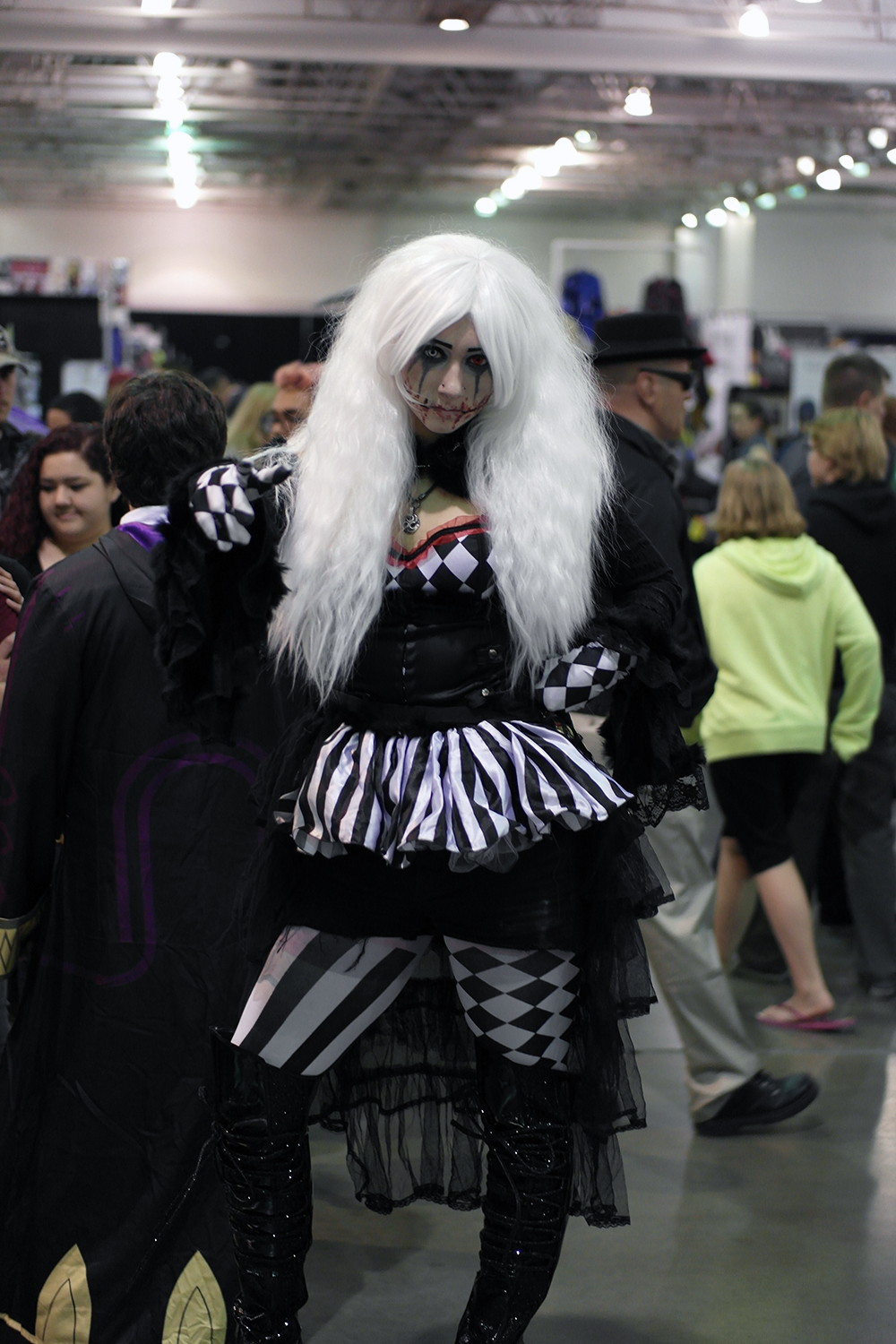





If you are any of the cosplayers in this slide show, please don't hesitate to get in touch with me if you would like high quality versions of the images. For everyone else, make sure you make it out to next years Tucson Comic Con for awesome cosplay, panels, and artists!
SFCCC: How to Publish Comics w/ Brian Pulido
One of the most common questions among comic book creators is: "how do I get my comic book published?". I sat in on Brian Pulido's panel at the Santa Fe Comic Con to try and get those answers for you.
If you don't know who Brian Pulido is, he is a comic book creator who has been in the game since 1991. Over his nearly 2 and a half decades as a professional comic creator, he has published books for Megadeth, WWF, ICP, Halloween, The Mummy and Static X.
The ideas from his panel, "How to Publish Comics", can be summarized into three categories.
Be Realistic
When you're starting to write a story, it is essential that you understand the marketplace that you are entering. You don't necessarily need to allow the market place to alter your course, but you should enter into it with realistic expectations.
It is definitely more fun to write about something that you are completely passionate about. However, if what you are passionate about is a very specific and unique story, before entering the marketplace, know how your book will fit into the grand scheme of things. Basically just have realistic expectations.
It should also be noted that it is impossible to forecast the marketplace. If you see that one year vampires are really popular, and you decide to write a vampire book to cash in on the trend, by the time you get to market with the story, the trend will have passed. That is no way to succeed in the comic industry. What it comes down to is: be true to yourself, be realistic about your books place in the market, and don't try to cash in on trends.
Finding the Right Team
Another hugely important aspect of publishing your first book is finding the right team. If you are just starting out in comics, chances are you will not be working with well established writers or authors right off the bat. Therefore, it's incredibly important to vet the potential partners. One of the hardest parts of starting out will be finding artists that are true to their word who will produce work in a timely fashion. You should not be afraid to try multiple people.
Make sure that you understand your Writer's/Artist's personality, commitments, hobbies, etc. Do they have a full time job? Are they a full time student? How committed will this person be to the project? All of these are important questions to ask prior to entering into a comic with someone. Let me share a story of Brian's with you.
For Brian's first book "Evil Ernie", he received submissions from 71 artists. He ended up trying out 12 of those artists, and ultimately all 12 failed in regards to quality or professionalism. When Brian says professionalism, he means (1) doing what you say you will do in the time that is agreed upon, (2) being honest about the time you will be available to work on the material, and (3) being in communication when things change. To simplify, it is finding like minded people to work with.
Publishing Methodology
It is now completely doable to publish your own book. The way that Brian does this is by hosting the world premier on Kickstarter, and going directly to the readers. After the close of the kickstarter project, Pulido & Team are able to deliver the product within 5-6 weeks. The way that this team accomplishes this is by completing all the creative work prior to the launch, meaning they are only going to kickstarter to cover printing costs.
Currently Brian has a kickstarter for a book Zack the Zombie Exterminator, and will be launching another Kickstarter on November 2nd for a book titled La Muerta. Make sure to check out Brian Pulido's work.
Follow Brian Pulido on Twitter @TheBrianPulido
Check out SFCC: www.santafecomiccon.com
SFCCC: Robert Mukes
When you see Robert Mukes, you automatically think Rufus, from House of 1000 Corpses. He has accomplished a lot more than this one film, but regardless, lets start with the 2003 horror classic.
After House of 1000 Corpses was completed, it sat on the shelf for 3 years. Universal didn't want to release it and MGM didn't want to release it. They simply did not understand the energy. Ultimately, Rob Zombie had to purchase the film back and find Lions Gate who was willing to Release it.
Robert says that he's Incredibly fortunate to have been a part of House of 1000 Corpses. A film that very few studios believed in initially, but once someone gave it a chance, it became a cult classic.
Through Robert's experiences, he is able to bring a unique perspective to his roles. As a child, he was a little kid who was picked on by bigger kids from the rough crowd. This provided him a lot of fuel for his roles. Now that he is, to say the least, a much larger man, he is able to channel those experiences that most people his size do not have. This leads to more authentic portrayals on the big screen. This ability mixed with his stature makes for a very unique and memorable actor.
When it comes down to it. Robert Mukes is just a guy who loves his work, and is ready and willing to do a lot more of it. He is a lot like House of 1000 Corpses. The film is done, and ready to be seen, full of raw energy, he just needs the right people to place in him the same faith that Lions Gate put in to House of 1000 Corpses, and they will get their very own classic Actor.
Follow Robert Mukes on Twitter @RobertMukes
Check out SFCC: www.santafecomiccon.com






